New offers for Booklaunch Club members
If you live in the UK, you’re already able to buy any book free of postage via our bookshop—and usually at better prices than better-known online retailers. (Yes, you know who.)
We also offer FREE unlimited access to our archive, where everything we have ever published is searchable.

If you’re hungry to hear a book being read, we offer scrolling podcasts. And if you want to get published, we can talk you through the process and get you in print.
But if you join the Booklaunch Club, we will welcome you with a FREE copy of any book you choose by one of our publishing partners: EnvelopeBooks, PostcardBooks and Broadsheet Books.
Also, when our partners bring out a new book, you’ll be able to get it at half price.
Wait! There’s more! As a member of the club, you’ll get each quarterly issue of Booklaunch delivered to your door.
And before the print magazine reaches the wider world, you’ll get a digital version of it emailed to your computer or mobile phone. Maybe you’re already a member. Then why not enrol a friend? We want this happy family of Booklaunchers to grow. So go online and sign up now!
ON OUR INSIDE PAGES
Page 1 Ukraine: editorial
Page 3 Mark L. Clifford on Hong Kong and China’s abuse of power
Page 4 Our Reader’s Guide to Ukraine and Russia
Page 9 The Gay Street Chronicle: Introducing Belle Nash, gay hero of Regency Bath
Page 13 Our Reader’s Guide to Ukraine-related fiction
Page 14 Stuart Sim defends dissent against its suppression
Page 15 George Tomaziu recalls Fascist and Communist imprisonment
Page 16 Brian Verity’s wife inherited the Huntington’s gene
Page 17 Marguerite Poland’s awardwinning novel blasts South Africa’s Victorian churchmen
Page 18 Our sponsorship opportunity: Bart O’Fehfon’s Lingualia
Page 20 Nick Wallis (of BBC podcast fame) on the Post Office’s Horizon IT scandal
EnvelopeBooks is looking for patrons to sponsor books and advise on new titles. If you’re interested in joining our co-publishing scheme, email: editor@booklaunch.london.
Ukraine. What next?
On 24 February Russia launched a barbaric war against Ukrainian civilians with the intention of not only acquiring an impoverished independent state with massive agricultural resources but of building a buffer-zone against countries that posed Russia no threat and, very possibly, trying to sucker those same countries into a larger war to justify its initial militarism.

One looks at all this in horror and wonders how it could happen, then thinks back to the history books and discovers that the real anomaly is not that Ukraine is now being fought over but that for much of the past 80 years, it hasn’t been.
Hitler’s invasion of Czechoslovakia in 1938, famously described by the then UK Prime Minister Neville Chamberlain as “a quarrel in a far-away country between people of whom we know nothing”.
In Dark Continent, Mark Mazower’s much applauded history of Europe in the 20th century, Ukraine is referred to as one of Germany’s east-European trophies but the country does not reapper in Mazower’s narrative after 1942. To work out when the country meant anything to us, we have to go back to the Crimean war of 1853–56, during which time it was exactly the non-country that Putin says it is.
Putin’s already erratic behaviour and that non-military responses were preferable. That was not treachery or appeasement either; it was fear. Either way, it has left Ukraine having to fight its own war.
The response to opposition
To argue that NATO should be doing more requires us to welcome Russian military firepower being turned on us and the kind of all-out engagement that only Putin has a vested interest in (and perhaps North Korea too).
Our unawareness of Ukraine, until now, is the same unawareness that Donald Trump made a public virtue of in 2017 when he defended his unwillingness to involve America in Ukraine’s troubles on the grounds that Washington did not know what was going on in Ukraine and therefore could not evaluate it.
We cannot afford that because we know—just as Putin knows—that however damaging such a war would be to Russia, it would be more damaging to us, because we have considerably more to lose by it. Such a war would give Putin what he sees as his best shot at overturning a global status quo that in his view has kept Russia under the Western heel for more than a century.
booklaunch.london
booklaunch.london
@booklaunch_ldn
@booklaunch_ldn
For a Westerner, summing up Ukrainian history is almost impossible. There is no meta-story. Ukraine has been the endless victim of invasions, conquests, treaties and reconquests, sometimes not even as an end goal, more as the incidental booty of other ambitions. Ukrainians may insist that their country was an autonomous nation long before Russia was (and Russians may insists, contrariwise, on Ukraine’s having always been Russian) but for much of the last thousand years Ukraine has been snared in the expansionist struggles of the Grand Duchy of Lithuania, the Kingdom of Poland, the Crimean Khanate, the Ottoman Empire, the Polish-Lithuanian Commonwealth, the Russian Empire and the USSR. Shameless as Putin’s war is, it is only the latest land grab in a millennium of land grabs.
Booklaunch Literary Challenge
Readership 50,500 UK copies plus website users
Booklaunch
No.4 “Relay Race” Set by Maggie Bawden
A favourite game in our family involves making up name chains where the last surname becomes the next first name, thus Upton Sinclair Lewis Carroll Nye Bevan … or Leslie Stephen King Charles Kingsley Amis. I challenge you to produce the longest string, using famous names—
Although the largest state in Europe and the world’s breadbasket, Ukraine is also poor and easily overlooked. Unless we knew it for some other reason, Putin’s invasion of Ukraine can only remind us of
Building US policy on the back of ignorance—especially if it was feigned ignorance—rightly infuriated the Ukrainian volunteers who run the Euromaidan Press, and who accused Trump of treachery and appeasement. That was not quite right; Trump was not appeasing, merely revealing his cavalier disregard for the complex. Trump saw Putin as a warlord with every right to do in his own backyard what warlords have always done, which is why on 22 February of this year he described Putin’s invasion as “genius” and “wonderful”, the mark of “a guy who’s very savvy”.
That’s one approach to Ukraine. Another is the one agreed by members of NATO: that military involvement would only inflame
War would turn the world upside down, erasing Western advantage in what Michael Gove might recognise as a levelling-down exercise. We’d all be starting at ground zero but with Russia finally freed from the liberal reforms that the West wants as the precursor to a new entente. A war with the West would bolster Putin’s position as an autocrat and isolationist. It would give him considerably more freedom of action to do what he wants and, presumably, an even larger imperial land mass to do it on.
In terms of cold, hard realpolitik, Putin is doing nothing more than taking the long view. As an avid reader of history, he sees the West’s dealings with Russia as a continuation of the same hostility that led Britain
and France to side with an ailing Turkey in the mid-nineteenth century, and then to destroy the dockyard at Sebastopol, the largest city in Crimea, in order to subdue Russian naval power in the Black Sea and cut off Russia southern maritime gateway. Western outrage at Putin’s psychopathic violence is therefore written off by Kremlin propagandists as nothing more than what Russian Foreign Minister Sergei Lavrov has described a “Russophobic frenzy”. As far as Russia is concerned, it counts for nothing.
That Russia’s woes and its belligerence are the product of the West’s ill-treatment of it is argued by Angus Roxburgh, a former BBC Moscow correspondent and a onetime adviser to the Kremlin. His book, The Strongman: Vladimir Putin and the Struggle for Russia (2013), seeks to explain how Putin went from reformer to tyrant. Drawing on dozens of exclusive interviews in Russia, from a time when he was advising Putin on press relations, Roxburgh not only repeats arguments put to him by his contacts but endorses them, claiming that the West threw away chances to bring Russia in from the cold by failing to understand its fears and aspirations following the collapse of Communism.
In this depiction of Russia as victim rather than perpetrator, Roxburgh blames Putin’s transformation on America, NATO and the EU:
Ever since [Putin] came to power, his biggest complaint to the West is that the post-Cold-War settlement never involved Russia. Russia wasn’t even consulted on what would happen. So America, basically, agreed to the accession of Eastern European countries into NATO and Russia had to put up with it but felt that it was cast as the villain in Europe—long before Putin
came to power—under Boris Yeltsin. Russian politicians were saying to Western leaders, “Look, we are democrats now. We have overthrown Communism, just as the people of Eastern Europe have. Why are you still treating us as if we are the enemy? It was the Soviet Union that was the enemy, it was the Communist power that was the enemy, and we are no longer that kind of state.” But effectively they were ignored and sidelined, and that became a festering sore for Putin. … Previous agreements—Yalta, after the war; the Helsinki Accords in 1975—the Soviet Union was involved in and so it could live with whatever came out of that, but the Pax Americana, which came into being after the Cold War, simply did not involve Russia. … Let’s face it, NATO has never really wanted to admit Ukraine and yet it pretended that it did, and that engendered even more anger in Putin. It possibly wasn’t a very sensible thing to do.
Angus Roxburgh’s idea that NATO toyed with Ukraine to provoke Russia is sharply contested by Bettina Renz, Professor of International Security at the University of Nottingham and author of Russia’s Military Revival (2017):
Ukraine has been involved with NATO in the Partnership for Peace programme since the 1990s but it [really came to the fore] after the annexation of Crimea in 2014, where public opinion … in Ukraine really swung in favour of NATO membership. NATO has been offering Ukraine a comprehensive assistance programme for military reforms … focused on democratic reforms and the need for longer-term anti-corruption reforms … but from the Ukrainian point of view, the opinion was “We don’t have the
luxury of time right now, in the face of Russian aggression.”
Angus Robertson, also a former BBC journalist (covering Central Europe) and now a member of the Scottish Parliament, argues that the belief that Russia has been kept out of the post-Soviet reality is a political falsehood. Russia, he points out, is a major player in the Organisation for Security and Cooperation in Europe, Europe’s biggest security organisation. (Russia has also retained all the positions formerly occupied by the USSR, not least its permanent membership of the UN Security Council, without its having to reapply, as it arguably should have done once the USSR was disbanded.)
Robertson adds that
Russia believes … that something was lost with the end of the Soviet Union, something was lost even with the end of Tsarist Russia, and all of the places that were formerly part of that empire, from Finland through the Baltic states, even including Poland, Moldova, Ukraine, Georgia—all of these places should be part of the “sphere of influence” of Russia, and that’s code for “Doing whatever the Kremlin says they should.” …
I believe people should be able to make decisions for themselves and not have the Big Guy on the block—and in this case a Big Bully on the block—tell you what you should and shouldn’t do. Ukraine has not been threatening Russia; it is Russia that has invaded Ukraine, for no good reason.
We can argue the history of geopolitics till the cows come home; those are the basic facts and, unfortunately, Russia has seen fit over the last 30 years to invade a whole series of its neighbours. … They invaded Georgia, Abkhazia and South Ossetia, they occupied part of Moldova and Transnistria, they flattened Grozny and Chechnya. … We’re dealing with somebody who believes that everybody close to Russia should jump and they’re prepared to send in the tanks to make it happen if people don’t agree. It’s not acceptable.
National character
Even though current circumstances appear novel, it is tempting to see Russia’s behaviour as reflecting a mindset hardwired into the landscape and culture and history of the region. According to Keir Giles, a senior consulting fellow at Chatham House, although the Western liberal mind wishes it were not the case, “throughout the centuries, Russia’s leaders and population have displayed patterns of thought and action and habit that are both internally consistent and consistently alien to those of the West.” Giles believes that the distinctive relationship between the ruler, the state and its subjects has affected how Russia has interacted with its neighbours and the rest of the world. Each new confrontation with Russia causes surprise and disarray in the West, but this is usually not the result of any change of policy in Moscow.
Consistent Russian state behaviours and demands can be traced not just to Soviet times but back to czarist foreign and domestic policy, and further to the structure and rules of Russian society. In this respect, what surprises some Western observers so much about Moscow’s current behaviour is simply Russia reverting to type.
In Giles’s view, we have to recognise long-standing Russian typologies. Some of these have been spelled out by Maria Alexandrovna Lipman, a Russian jour-

How to read Ukraine
This is not the happiest edition of Book–launch. With Vladimir Putin’s war on Ukraine and the violent projection of his nasty, cruel, vain, narcissistic, self-pitying, psychopathic personality on a population of innocents, we found ourselves clutching for books to help us get up to speed with Ukraine’s history and current dilemma.
Our suggestions are far from definitive. We have not taken into account the many readings that may exist beyond the UK market. We don’t include any Chinese texts, or books from parts of the world that have sided with Russia in recent years. Nor have we noted the mass of literature that originates from the academic Left, which tends to sympathise with Putin as the victim of NATO, the EU and the American imperialist-militarist-industrialist- consumerist-capitalist complex—with one exception: the book we refer to briefly on Page 4.
We also offer no writings on Russia and Ukraine that may have emerged from the religious right, whether it be American evangelicals or the Orthodox church, both of which applaud Putin in his campaign against the “moral crimes” of abortion, homosexuality and secularism. Nor do the thoughts of Donald Trump put in an appearance.
Our guide is, however, hemmed in by titles that deal with other examples of autocratic, undemocratic regimes. On the facing page, Mark L. Clifford sounds alarm bells about China’s treatment of Kong Kong; on page 15 we carry George Tomaziu’s memoir of being incarcerated and brutalised for 13 years by Romania’s Communists, after having been incarcerated and brutalised by Romania’s Fascists during the war; and on page 14 Stuart Sim sounds a warning about the suppression of dissent here at home.
Nick Wallis’s The Great Post Office Scandal, on the back cover, could be said to document another sort of autocracy— that of the PO mandarins, who knowingly allowed innocent postmasters to suffer— while Marguerite Poland’s award-winning novel set in South Africa in the 19th century documents the indifference and condescension of the Church towards its black African pastors.
And then there is the late Brian Verity’s angry indictment of the ill-treatment of his wife, after she was diagnosed with Huntington’s disease, by her doctor, the area health authority, her nursing colleagues, her local vicar, the media, the health minister, several support agencies, her own family and the author himself.
It is with relief, therefore, that we point our readers to four pages of silliness at the centre of this issue, all based around the extraordinary persona of the newly discovered Bellerophon “Belle” Nash. Belle, whom we are led to believe was the grandson of Beau Nash of Bath, lived an unapologetically gay life in Regency Bath of the 1820s and 30s, and fought against all forms of injustice. In future instalments of his books we will see him taking up the cause of plantation slaves in the West Indies. In the first book in William Keeling’s new series (The Gay Street Chronicles), Belle sets out to explore why a soufflé fails to rise and ends up challenging the cosy status quo of Bath’s legal establishment, a topic that Oliver Bullough warns us about, in respect of London and Russia, in “The Problem of Money” on page 8. Doh—and I was going to end this on a high.
Dr Stephen Phineas Games Editor and PublisherWhen the People’s Republic of China resumed sovereignty over Hong Kong in 1997, it solemnly promised to uphold for fifty years the freedoms that had developed during the British colonial era. Halfway to that milestone, China has instead embarked on a campaign to systematically dismantle the territory’s foundational freedoms: of the press, of speech, and of assembly, all underpinned by the rule of law. The party has done this with the help of the Hong Kong government (not democratically elected) and its business elite, who are too shortsighted, too concerned with immediate monetary or
and torture are common. The territory’s police responded from the first days with needless violence, setting off an escalating but completely avoidable cycle of confrontation with protesters. There was no attempt to hold the police accountable, let alone to apologize for evident excesses. At the end of a year in which thousands of rounds of tear gas and rubber bullets were fired, one in which protesters invaded and vandalized the Legislative Council, burned subway stations, fired catapult and slingshot projectiles at police, and literally ripped up the city streets, a resounding majority voted for the demonstrators’ pro-democracy agenda.
book. The National Security Law explicitly states that its provisions are global; what China is determined to do in Hong Kong it intends to do next in Taiwan (which it regards as a breakaway province) and, to a lesser degree, in other Asian neighbors like South Korea and Japan, and then around the world, from Africa to Australia. The United States and Europe are not immune; in fact, U.S. citizens have already been targeted. Universities have warned their students that what they say or write in class could be used against them in China, and the State Department has recently urged citizens to reconsider travel to Hong Kong
takeover of eastern Europe in the late 1940s and the destruction of Shanghai following the 1949 Communist Revolution in China have we seen anything like the devastation Beijing is wreaking in Hong Kong. The free world ignores the tactics on display there at its peril.
This book makes an argument for freedom. The people who lived in late twentieth-century Hong Kong—most of whom were Chinese—developed the territory into one of the most freewheeling and prosperous places in the world. At its best, this process saw Hong Kongers and their colonial rulers combine the best of British
Welcome to Hong Kong: the canary in the cage of Chinese expansionism
EDITOR’S NOTE
Does British colonial status have an upside? For 150 years Hong Kong’s residents enjoyed freedoms that did not exist in mainland China. Today, under China, basic freedoms have disappeared and activists have been jailed en masse. Between 1992 and 2021 Mark L. Clifford got to know student protestors, billionaire businessmen and senior government officials. He argues that as China emerges as a superpower, all regions falling under its control will suffer in the same way. A powerful articulation of one of the most important geopolitical standoffs of our time.
READERS’ COMMENTS
Dexter Roberts: A must-read account of the ongoing destruction of Hong Kong and why it matters to the world.
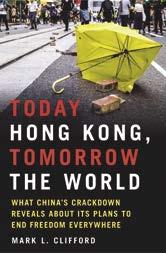
Perry Link: A masterly study of Hong Kong as the front line in the worldwide quest for human freedom.
Jeffrey E. Garten: A riveting and passionate account of China’s attack on Hong Kong.
status advantages, or too willfully naïve to understand what is at stake.
In 2019, the people of Hong Kong mounted the most sustained challenge to China’s rule since Mao Zedong founded the People’s Republic in 1949. Hong Kongers had long been pressing Beijing to make good on its promises in the city’s mini-constitution for universal suffrage. This wasn’t anything radical, simply the right to elect the mayor (known locally as the chief executive) and the city council (the Legislative Council, a largely toothless body that didn’t even have the authority to initiate spending bills). Notwithstanding its repeated pre-handover promises, Beijing couldn’t stomach the idea of sharing power with anyone who wasn’t a ‘patriot’ who ‘loves the country’. Only those politicians who support the Chinese Communist Party (CCP) are eligible for office now, thus disqualifying the overwhelming majority of Hong Kongers who support democracy. Simply put, Beijing’s refusal to let Hong Kongers elect their mayor and city council set the stage for conflict. Hong Kong’s fight to preserve its freedoms against threats from mainland China is an ongoing test of a democratic society’s ability to withstand authoritarian China’s pressure. The results to date have been discouraging for anyone who believes in democracy.
The summer of 2019 began with peaceful demonstrations, as some two million people filled the city’s streets to oppose a law that would have allowed extradition to mainland China, where Hong Kong’s legal protections do not apply and where arbitrary arrests
TODAY HONG KONG, TOMORROW THE WORLD
WHAT CHINA’S CRACKDOWN REVEALS ABOUT ITS PLANS TO END FREEDOM EVERYWHERE MARK L. CLIFFORD
The History Press Hardback, 304 pages February 2022 9780750999465
RRP £20.00
China’s Communist Party, angered at its inability to bring Hong Kong to heel and convinced that Western plots to overthrow China lay at the roots of the protests, responded by ushering in an ominous new phase with the July 1, 2020, imposition of a draconian National Security Law and subsequent arrests of dozens of leaders of the democracy movement. Thus began a period of ‘reeducation’ redolent of Mao Zedong’s bloody Cultural Revolution, ten years of madness from 1966 to 1976 that saw friends and families on the mainland turn against one another as the revolution devoured its own. In the first year of the National Security Law’s introduction in Hong Kong, more than one hundred people, including journalists and political leaders, were arrested under the law’s vague and sweeping provisions. Many were denied bail, implicitly deemed guilty by handpicked judges even though it would be a year or more until their trials. Neighbor spied on neighbor, reporting in to a special national security hotline, and kindergarten children goosestepped in fulsome displays of patriotism. Books were stripped from library shelves, movies censored, and the Apple Daily newspaper forcibly shuttered. Even the act of laying flowers at the site of a pro-democracy suicide victim was deemed criminal.
What is happening in Hong Kong provides a blueprint for the sorts of tactics that China is increasingly wielding against democratic societies around the globe—its strategy of crushing dissent and silencing independent voices is central to its international play-
‘due to arbitrary enforcement of local laws’. The challenge posed by China has grown since the 2008 global financial crisis. The United States and other open societies relied in large part on China’s massive stimulus program to reflate the global economy and, in turn, they muted their longstanding concerns about civil liberties and human rights violations in the People’s Republic. For China, the financial crisis revealed the Western financial system, which it had long tried to emulate, as corrupt and showed governments unable to mount coherent reforms. More recently, the erratic response to COVID-19 in liberal democracies has further strengthened China in its belief that illiberal authoritarianism, buttressed by its techno-surveillance state, represents a viable alternative not just for China but for other countries as well.
China’s use of a combination of aggressive legal and security policies, above-ground allies and underground organisations is not just a threat to Hong Kong (where, remarkably, the Chinese Communist Party remains an underground organisation). This tiny former British colony is a testing ground for attempts to limit the freedoms of open societies. The Communist destruction of the territory’s liberties marks the only time in contemporary history when a totalitarian government has destroyed a free society— has shuttered a free press and ended free speech and freedom of assembly, and curtailed the right to be presumed innocent, the right to a jury trial, and the right to hold private property without the government arbitrarily seizing it. Not since the Soviet
institutions (rule of law, and freedom of press, religion, and assembly) with a lighttouch government to develop a strong sense of civic freedom—but without democracy, without a chance to choose their leaders at the ballot box. Notwithstanding a belated attempt by Chris Patten, the last colonial governor, to introduce more representative democracy; despite the repeated and clear support for democracy by Hong Kong voters for the three decades since Legislative Council elections began; and contrary to the repeated promises of the incoming Chinese rulers, Hong Kong has been denied democracy. This democratic denial had strong support in both the Chinese and expatriate business communities who were eager to see taxes and wages remain low. For its part, the United States was too preoccupied with Hong Kong’s role as a Cold War ally to press for more democracy. Despite ongoing official efforts to tamp down politics, Hong Kongers took advantage of Britain’s drawn-out colonial rule—its departure from Hong Kong in 1997 took place almost half a century after it left most other colonies—to develop a unique culture of freedom. That freedom is now being extinguished by a China that permits only the control of oneparty rule. This book is about how freedom was nurtured, how it blossomed and how it now struggles to survive in an increasingly hostile environment.
The Summer of Democracy
June 4, 2019—the thirtieth anniversary of the killings near Tiananmen Square, when Chinese
Our price £13.99 inc. free UK postage www.booklaunch.shop continued in the book
A Reader’s Guide to Ukraine and Russia
In an attempt to understand Russia’s war on Ukraine and the obstacles that stand in the way of peace, Booklaunch has compiled a Reader’s Guide with a range of mostly contemporary, mostly non-fiction titles. We categorised what we found under the titles “The Character of Ukraine”, “European Background”, “Under the Soviets”, “Under the Nazis”, “The Problem of Russia”, “The Problem of Putin” and “The Problem of Money”. With the exception of one title at the foot of this page (bottom right), we have not included examples of the contrarian double-think favoured by the Kremlin, prevalent though it is on university campuses. We thank three leading academics who also kindly recommended books for our list: Robert Brinkley (RB), British Ambassador to Ukraine 2002–06 and a senator of the Ukrainian Catholic University; Ľubica Polláková (LP), Assistant Director, Russia and Eurasia Programme, Chatham House; and Uilleam Blacker (UB), Associate Professor in the Comparative Culture of Russia and Eastern Europe, UCL.
The character of Ukraine
UKRAINE
BIRTH OF A MODERN NATION
SERHY YEKELCHYK
OUP, 2007
take on the interpretations developed by pre-Soviet patriotic historians. They were also influenced by the concepts and methods of the Soviet historical profession. Ukrainian nationalists and Soviet ideologues both believed in ethnic groups that possess clearly defined features and share a common destiny. Grounding a nationality in an ancient past granted it legitimacy, and defining the exact moment of its emergence as a separate ethnic group justified present-day political boundaries.
Present-day historians of continued in the book
READERS’ COMMENTS
Andrew Wilson: This is a wonderful book, ideal for students and non-specialists alike. It takes the story up to the Orange Revolution in 2004, and provides an excellent primer for further study in either Ukrainian history or contemporary politics and society.
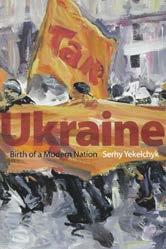
When Ukraine became independent in 1991, the new state began developing a historical pedigree that would anchor modern political realities in a venerable past. This was not a task unique to Ukrainian historians. Italian and German historians faced a similar problem in the 19th century. The temptation to write history backwards was also typical of new national histories elsewhere.
In any case, Ukrainian scholars were not writing history from scratch. They could
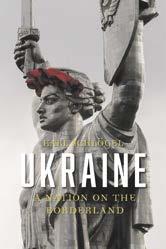
Ronald Grigor Suny: Serhy Yekelchyk has written a modern history of modern Ukraine that questions nationalist mythologies and patriotic claims to an uncontested past and shows how making a nation requires the hard work of scholars and poets, soldiers and statesmen, and even Soviet bureaucrats. This is simply the best history of this new nation that we have!
Recommended by UB
UKRAINE A NATION ON THE BORDERLINE KARL SCHLÖGEL Reaktion Books, 2018
In recent years, Ukraine has been forced to confront the political conundrum posed by Russia’s invasion of its eastern regions and by its ongoing information war. To his exploration of this problem, Karl Schloegel, Professor Emeritus of the European University Viadrina in Frankfurt (Oder), adds detailed explorations of Ukraine’s major cities: Lviv, Odessa, Czernowitz, Kyiv, Kharkov, Donetsk, Dnepropetrovsk and Yalta, cities whose often troubled and war-torn histories are as varied as the nationalities and cultures that make them what they are today—survivors with very particular identities and aspirations, never more united than they are today.
THE GATES OF EUROPE A HISTORY OF UKRAINE SERHII PLOKHY Penguin, 2016
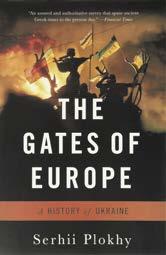
one week after the Ukrainian referendum and President George H.W. Bush declared the final victory of the West in the prolonged and exhausting Cold War.
The world next saw Ukraine on television screens in November 2004, when festive orange-clad crowds filled the squares and streets of Kyiv demanding fair elections, and got their way.
Events in Ukraine took an unexpected and tragic turn in early 2014, when a confrontation between protesters and government forces violently disrupted the festive, almost street-party atmosphere of the earlier protests. In full view of television cameras, riot police and government snipers opened fire, wounding and killing dozens of pro-European demonstrators.
The images shocked the world. continued in the book
READERS’ COMMENTS
Robert Brinkley: Born in Soviet Ukraine, Plokhy is now Professor of Ukrainian History at Harvard. This is a wonderfully readable and accessible book, which wears lightly Plokhy’s profound learning and understanding.
Ukrainians probably have as much right to brag about their role in changing the world as Scots and other nationalities have. In December 1991, as Ukrainian citizens went to the polls en masse to vote for their independence, they also consigned the mighty Soviet Union to the dustbin of history. The events in Ukraine then had major international repercussions and did indeed change the course of history: the Soviet Union was dissolved
Simon Sebag Montefiore: Complex and nuanced, refreshingly revisionist and lucid, this is a compelling and outstanding short history of the blood-soaked land that has so often been the battlefield and breadbasket of Europe.
Recommended by RB, UB, LP
WESTERN MAINSTREAM MEDIA AND THE UKRAINE CRISIS A STUDY IN CONFLICT PROPAGANDA OLIVER BOYD-BARRETT Routledge, 2018
This study by an apologist for Russia, argues that Western media went out of their way to demonise Vladimir Putin after Russia’s annexation of parts of Ukraine in 2014, and complains of the overthrow of the “democratically elected Yanukovych government” by US-backed NGOs and rightist militias. He also “counters Western media concentration” over who shot down Malaysian Airways flight MH17. The author is not a known Ukrainian expert and quotes no standard Ukrainian language sources.
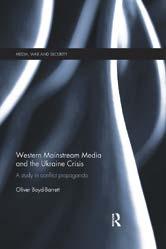
THE UKRAINIANS UNEXPECTED NATION
ANDREW WILSON
Yale University Press, 2015
present Ukraine—as the product of various imaginations, both Ukrainian and other. Alongside the more obvious narrative of political and social change, I have therefore included representations of Ukraine in literature and the arts and, in the chapter on geopolitics, cartographers’ images.
I have also tried to deconstruct, in the sense of debunk, myths about Ukraine and its past—both Ukrainian nationalists’ flights of fancy and Russian and other rival nationalists’ attempt to belittle or deny Ukraine. This should not be taken as an attempt to undermine the Ukrainian idea, just to build it on more secure foundations.
The Ukrainians may now be becoming a nation before our very eyes, but this does not mean that they were always Ukrainians or that they were always destined to become such. Often the inhabitants of what is now Ukraine would have been better described as rebellious peasants, members of a particular faith, left-wing activists or whatever. Often they thought in terms of a local identity; often they saw themselves as part of other communities, some still existing, some long disappeared. The process whereby they became Ukrainians could’ve unfolded in different ways. continued in the book
UKRAINE CRISIS WHAT IT MEANS FOR THE WEST ANDREW WILSON Yale University Press, 2014
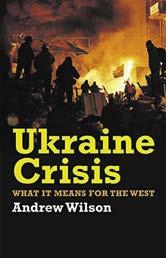
within central Europe, aided by US diplomatic inattention in the area, and how Putin’s conservative values project is widely misunderstood in he West.
The book examines Yanukovych’s corrupt “coup d’etat” of 2010 and provides the most intimate day-by-day account we have of the protests in Kiev from November 2013 to February 2014 (at which Wilson was present). It explores the military coup in Crimea, the role of Russia and long-term tensions with the Muslim Crimean Tatars. It covers the election of 25 May 2014 and the prospects for the then new president Petro Poroshenko. And it analyses other states under pressure from Russia—Georgia, Moldova, Belarus. “Russia will clearly not stop at Ukraine.”
ABOUT THE AUTHOR
Nationalists tend to see their nation as eternal, as an historical entity since the earliest times. Their history is written as the story of the nation’s trials and triumphs. In reality nations are formed by circumstance and chance. Ukrainians like to talk about the “national idea”. Precisely so. Concepts such as nations really belong to the realm of political and cultural imaginations.
The approach of this book is therefore deconstructivist. Nations are cultural constructs and this is how I have tried to
BORDERLAND
A JOURNEY THROUGH THE HISTORY OF UKRAINE ANNA REID
Weidenfeld & Nicolson, 2015 revised edition
READER’S COMMENT
Robert Brinkley: A lively, detailed and well informed account by the UK’s leading academic expert on Ukraine. Wilson is Professor of Ukrainian Studies at the School of Slavonic and East European Studies, University College London. Recommended by RB
sionately pro-European, harks back to Ukrainians’ long struggle against foreign rule and has a small but nasty far-right fringe. The second, which powered the Maidan and dominates the current government, is about values rather than ethnicity. Being “Ukrainian”, for the hordes of patriotic young people manning a starburst of new charities and campaign groups in the capital, is not about what your surname is or what language you speak. It is about making a moral choice, about wanting a decent country and being a decent person.
They are proud that the Ukrainian journalist who initiated the Maidan is Afghan by background, and that the first two demonstrators shot dead by police were ethnically Belarusian and Georgian. continued in the book
READERS’ COMMENTS
Robert Brinkley: An excellent introduction to over 1,000 years of conflict and culture by a British writer and journalist who has lived in Kyiv and knows Ukraine well.
The Ukraine issue has rapidly escalated into a major geopolitical crisis, the most severe test of the relationship between Russia and the West since the Cold War. And it is far from resolved. Andrew Wilson’s 2014 account situates the crisis within Russia’s covert ambition since 2004 to expand its influence within the former Soviet periphery and over countries that have since joined the EU and NATO, such as the Baltic States. He shows how Russia has spent billions developing its soft power
UKRAINE
THE STORY OF A DEAD SOLDIER TOLD BY HIS SISTER OLESYA KHROMEYCHUK ibidem, 2021
Andrew Wilson has published widely on the politics of Eastern Europe, including Ukraine’s Orange Revolution and Virtual Politics: Faking Democracy in the Post-Soviet World, both of which were joint winners of the Alexander Nove Prize, 2007. His publications at the European Council on Foreign Relations (www.ecfr.eu) include The Limits of Enlargement-Lite: European and Russian Power in the Troubled Neighbourhood and Meeting Medvedev: The Politics of the Putin Succession
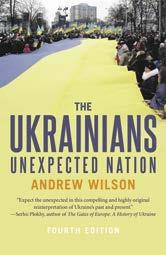
personal memoir and essay, Khromeychuk attempts to help her readers understand the private experience of what until January 2022 was an almost forgotten war in the heart of Europe and the private experience of war as such. This book will resonate with anyone battling with grief and the shock of the sudden loss of a loved one.
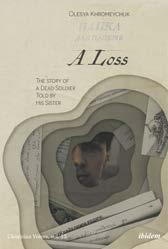
READERS’ COMMENTS
Anna Reid: Moving, intelligent, and brilliantly written, this is a sister’s reckoning with a lost brother, an émigré’s with the country of her childhood, and a scholar’s with her own suddenly acutely personal subject matter. A wonderful combination of emotional and intellectual honesty; very sad and direct but also rigorous and nuanced. It even manages to be funny.
Ukraine is now solidly and indisputably a real country. Two generations can no longer remember or even conceive of rule from Moscow. For them there is nothing comic or surprising about the idea of a Ukrainian parliament, Foreign Ministry or Supreme Court—the institutions may be loathed but their existence is taken for granted.
Two strands of national identity have come into being. The first, though pas-
Daily Telegraph: A mixture of travelogue, history, political analysis and anecdote makes this a highly digestible introduction to the tragic plight of a country whose very name means “Borderland”. “The West … had difficulty taking Ukraine seriously,” Reid writes. Her first book is a praiseworthy attempt to correct this injustice.
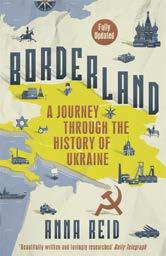
Recommended by RB, LP
A poignant recollection of losing her brother Volodya in combat in the Donbas in 2017 by the Director of the Ukrainian Institute London. The story is of one death among many in the war in eastern Ukraine, and its author takes the point of view of a civilian and a woman, perspectives that tend to be neglected in war narratives, focusing on the stories that play out far away from the war zone. Through a combination of
Rory Finnin: There has always been too much silence around the armed conflict in eastern Ukraine — Europe’s forgotten war. Olesya Khromeychuk refuses to bend to this silence. In vivid, intimate prose and with unflinching honesty, she introduces us to the brother she lost in the war and found in her grief. Wise and unforgettable. Recommended by RB, UB
European background
BLOODLANDS
EUROPE BETWEEN HITLER AND STALIN
TIMOTHY SNYDER
Vintage Books, 2010
Under the Soviets
Socialism and Stalinism (1933–38), the joint German-Soviet occupation of Poland (1939–41) and then the German-Soviet war (1941–45), mass violence of a sort never before seen in history was visited upon this region. The victims were chiefly Jews, Belarusians, Ukrainians, Poles, Russians and Balts, the peoples native to these lands.
These people were all victims of murderous policy rather than the casualties of war. Not a single one of them was a soldier on active duty. Most were women, children and the aged; none were bearing weapons; many had been stripped of their possessions, including their clothes. continued in the book
READER’S COMMENT
RED FAMINE STALIN’S WAR ON UKRAINE ANNE APPLEBAUM
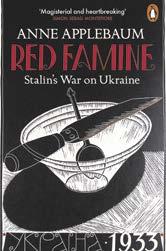
Allen Lane, 2017
not begin with the famine and did not end with it. Arrests of Ukrainian intellectuals and leaders continued through the 1930s. For more than half a century after that, successive Soviet leaders continued to push back harshly against Ukrainian nationalism in whatever form it took, whether as postwar insurgency or as dissent in the 1980s. During those years Sovietisation often took the form of Russification: the Ukrainian language was demoted, Ukrainian history was not taught.
In the middle of Europe in the middle of the 20th century, the Nazi and Soviet regimes murdered some 14 million people. The place where all the victims died, the “bloodlands”, extends from central Poland to western Russia, through Ukraine, Belarus and the Baltic states.
During the consolidation of National
Tony Judt: The stunning contribution of Tim Snyder’s book is to present a synthetic account by an East European historian in which the focus is on the geographic zone where the lethal policies of Hitler and Stalin interacted, overlapped, and mutually escalated one another. As Snyder vividly demonstrates, their combined impact on the people living in the “bloodlands” was quite simply the greatest man-made demographic catastrophe and human tragedy in European history.
Recommended by RB, UB, LP
Under the Nazis
BLACK EARTH
THE HOLOCAUST AS HISTORY AND WARNING
TIMOTHY SNYDER
Vintage (2016)
caust was a unique event. But as Timothy Snyder shows, we have missed basic lessons of the history of the Holocaust, and some of our beliefs are frighteningly close to the ecological panic that Hitler expressed in the 1920s. “He argues that the world is still susceptible to the inhuman impulses that brought about the Final Solution,” writes Jeffrey Goldberg. As ideological and environmental challenges to the world order mount, our societies might be more vulnerable than we would like to think.
READERS’ COMMENTS
Anne Applebaum: In this unusual and innovative book, Timothy Snyder takes a fresh look at the intellectual origins of the Holocaust, placing Hitler’s genocide firmly in the politics and diplomacy of 1930s Europe. Black Earth is required reading for anyone who cares about this difficult period of history.
What actually happened in Ukraine between the years 1917 and 1934? In particular, what happened in the Autumn, Winter and Spring of 1932–33? What chain of events and what mentality led to the famine? Who was responsible? How does this terrible episode fit into the broader history of Ukraine and of the Ukrainian national movement?
Just as importantly: what happened afterwards? The Sovietisation of Ukraine did
EAST WEST STREET
PHILIPPE SANDS
Orion Publishing (2017)
Above all, the history of the famine of 1932–33 was not taught. Instead, between 1933 and 1991 the USSR simply refused to acknowledge that any famine had ever taken place. The Soviet state destroyed local archives, made sure that death records did not allude to starvation, even altered publicly available census data in order to conceal what had happened.
But in 1991 Stalin’s worst fear came to
READERS’ COMMENTS
Dominic Sandbrook: Meticulously researched, blisteringly written.
Simon Sebag Montefiore: Magisterial and heartbreaking.
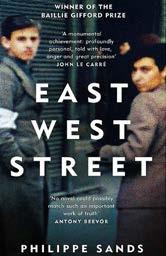
Nick Rennison: Compelling in its detail and in its empathy.
Timothy Snyder: Her account will surely become the standard treatment of one of history’s great political atrocities.
Recommended by RB, LP, UB
their own families, in and around Lviv. It is through these two remarkable men—Hersch Lauterpacht and Rafael Lemkin—that the words ‘crimes against humanity’ and ‘genocide’ became part of the judgement at Nuremberg and our lexicon of hate. A powerful meditation on the way memory, crime and guilt leave scars across generations.
A law professor at University College London, Philippe Sands QC has written widely about international law and participated in the 1992 Climate Change Convention and legal cases concerning the Belmarsh and Guantánamo detainees. He is currently pressing for a new internationally
READERS’ COMMENTS
Lisa Appignanesi: Even when charting the complexities of law, Sands’s writing has the intrigue, verve and material density of a first-rate thriller.
Snyder’s Bloodlands (2010; see above) was an acclaimed exploration of what happened in Eastern Europe between 1933 and 1945, when Nazi and Soviet policy brought death to some 14 million people. Black Earth explores the ideas and politics that enabled the worst of these policies, the extermination of the Jews.
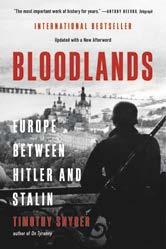
It comforts us to believe that the Holo-
Ian Kershaw: Timothy Snyder’s bold new approach to the Holocaust links Hitler’s racial worldview to the destruction of states and the quest for land and food. Black Earth uses the recent past’s terrible inhumanity to underline an urgent need to rethink our own future.
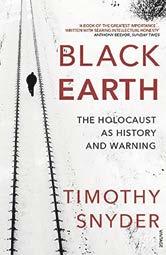
Recommended by LP
Everything that happens is inevitable and yet comes as a surprise. An invitation to deliver a lecture in the western Ukrainian city of Lviv leads international human rights lawyer Philippe Sands to unearth the origins of international law and fill in the terrible gaps in his own family’s history. Sands reveals the extraordinary story of two Nuremberg prosecutors who discovered the responsibility of the former Nazi governor they are prosecuting for the murder of
Daniel Finkelstein: A magnif–icent book. A work of great brilliance. There is narrative sweep and intellectual grip. Everything that happens is inevit–able and yet comes as a surprise. I was moved to anger and to pity. In places I gasped, in places I wept. I wanted to reach the end. I couldn’t wait to reach the end. And then when I got there I didn’t want to be at the end.
Recommended by LP
In Occupied Ukraine
IN ISOLATION DISPATCHES FROM OCCUPIED DONBAS STANISLAV ASEYEV
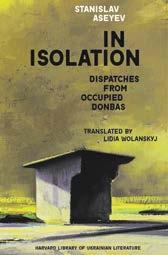
Harvard Ukrainian Research Institute, 2022
The problem of Russia
suffer in Russia’s hybrid war on its territory. Arrested and unlawfully imprisoned by separatist militia forces for “extremism” and “spying”, Aseyev was held captive and subjected to intermittent torture for over two and a half years. In 2021, In Isolation was awarded the prestigious Taras Shevchenko National Prize.
MOSCOW RULES WHAT DRIVES RUSSIA TO CONFRONT THE WEST KEIR GILES
Brookings Institution (2018)
READER’S COMMENT
In this collection of reports, Stanislav Aseyev attempts to understand the reasons behind the success of Russian propaganda among the residents of the industrial region of Donbas. For the first time, an inside account shows the toll on real human lives and civic freedoms that citizens continue to
Julian Evans: A rare and unsettling insider’s account of conditions in the “Donetsk People’s Republic”. … Aseyev examines unrelentingly, piercingly and scathingly why Ukrainians in the east of the country supported, and continue to support, the separatists and mercenaries and their Kremlin sponsors — in effect, how Putin’s misinformation campaign successfully revived the Soviet mindset in the Donbas.
Recommended by UB
The problem of Putin
PUTIN’S PEOPLE HOW THE KGB TOOK BACK RUSSIA AND THEN TOOK ON THE WEST CATHERINE BELTON
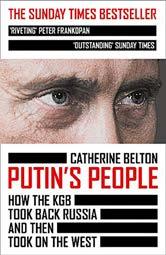
William Collins (2020)
people conducted their relentless takeover of private companies and the economy, siphoned billions, blurred the lines between organised crime and political powers, shut down opponents, and then used their riches to extend influence in the West.
Of particular interest is how Putin took advantage of London lawyers’ willingness to take huge fees to do his business for him and tie up his rivals in red tape.
In a story that ranges from Russia to England and Switzerland to Trump’s America, Putin’s People is a gripping and terrifying account of how hopes for the new Russia went astray, with stark consequences for its inhabitants and, increasingly, the world.
READERS’ COMMENTS
Peter Frankopan: This riveting, immaculately researched book is arguably the best single volume written about Putin, the people around him and perhaps even about contemporary Russia itself in the past three decades.
Chris Patten: An extraordinarily important book.
Oliver Bullough: Meticulously researched and superbly written; terrifying in its scope and utterly convincing in its argument … The Putin book that we’ve been waiting for.
Recommended by LP
In Moscow Rules, Keir Giles argues that Western leaders have for too long expected Russia to see the world as they do. But the world looks very different from Moscow. Seen through Western eyes, Russia appears unpredictable and irrational. Yet Russian leaders from the czars to Vladimir Putin have followed a consistent internal logic
WE NEED TO TALK ABOUT PUTIN HOW THE WEST GETS HIM WRONG MARK GALEOTTI
Ebury Press (2019)
when dealing with their own country and the world outside.
Giles, a senior expert on Russia at Chatham House, suggests that accepting that Russia will never think and act as a Western nation is essential for managing the challenge from Moscow. He argues that recognising how Moscow’s leaders understand the world around them—not just Putin but his predecessors and eventual successors— will help their Western counterparts find a way of living with Russia without lurching from crisis to crisis.
READERS’ COMMENTS
Stephen J. Blank: Elegantly written, with vital insights on virtually every page, this book far surpasses most of the current literature on Russian domestic and foreign policy. Giles illuminates Putin’s world in all of its dimensions in a way that few other authors have done.
Sir Roderic Lyne: Keir Giles has explained with clarity, concision and deep knowledge why Russia cannot be understood by Western criteria alone. His book is a much-needed antidote to simplistic judgements. It should be required reading for all who deal with Western policy towards Russia.
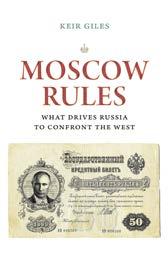
Recommended by LP
the man behind the myth, addressing the key misperceptions of Putin and explaining how we can decipher his motivations and next moves. From Putin’s early life in the KGB and his real relationship with the USA to his vision for the future of Russia—and the world—Galeotti draws on new Russian sources and explosive unpublished accounts to give unparalleled insight into the man at the heart of global politics.
READERS’ COMMENTS
Foreign Affairs: Easily the shrewdest and most insightful analysis yet of Putin’s policymaking.
The Times: In fewer than 150 pithy pages, Galeotti sketches a bleak but convincing picture of the man in the Kremlin and the political system that he dominates.
Despite the millions of words written on Putin’s Russia, the West still fails to truly understand one of the world’s most powerful politicians, whose influence spans the globe and whose networks of power reach into the very heart of our daily lives. In this essential primer, Professor Mark Galeotti uncovers
The Guardian: Mark Galeotti, in We Need to Talk About Putin, has distilled a great deal of research and thought into a slim and engaging volume that reads like a primer for anyone poised to enter a negotiation with the Russian president. The Scotsman: Dynamic, authoritative and often witty.
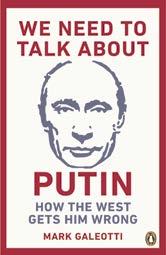
The Problem of Money
THE RUSSIAN ECONOMY UNDER PUTIN EDITED BY TORBJÖRN BECKER, SUSANNE OXENSTIERNA
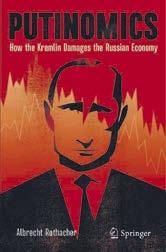
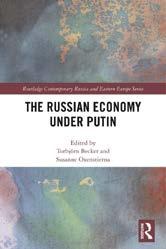
Routledge (2019)

A comprehensive view of the state of the Russian economy, edited by the Director of the Stockholm Institute of Transition Economics (SITE) at the Stockholm School of Economics and the Deputy Research Director at the Swedish Defence Research Institute (FOI). It considers the extent of Russia’s integration in the world economy and the prospects for economic reform.
MONEYLAND
WHY THIEVES AND CROOKS NOW RULE THE WORLD AND HOW TO TAKE IT BACK OLIVER BULLOUGH
Profile Books / Main edition (2019)
READER’S COMMENT
Tom Tugendhat: Corruption undermines democracy, weakens institutions and erodes trust, it destroys lives and impoverishes millions. Moneyland starts from that truth and tells London’s part of that story.
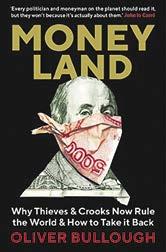
PUTINOMICS
HOW THE KREMLIN DAMAGES THE RUSSIAN ECONOMY
ALBRECHT ROTHACHER
Springer (2021)
This book sheds new light on the political economy of Russia under Putin’s rule. The author, a former EU diplomat, presents a historical review of Russian economic activity and its 60 years of state-Communist mismanagement, followed by oligarchic privatization. The book offers profound insights into the mechanics of the way the country is managed, the arbitrariness of Russian law, and the often corrupt administration that systematically discourages entrepreneurship and the emergence of an independent middle class.
TAX CONSULTANTS

We are an established firm based in the City, specialising in handling the taxation and accountancy affairs of freelance journalists. We have clients throughout the UK. Our services include accounts preparation, tax reporting, business start-ups and advice on possible incorporation, payroll services, management accounts, bookkeeping and more.
For further details, contact us on T 020 7606 9787 E info@southwell-tyrrell.co.uk
SOUTHWELL, TYRRELL & CO

Waterproof washable elegant raincoats for men and women beautifully made in our Oxfordshire workshop
Being a true accounting of certain uncommon events occurring lately to divers persons in and around the City of Bath
HISTORIC ARCHIVE FOUND IN GAY ST.
Neighbours are astonished.
An old trunk, discovered in Gay Street, Bath, has been found to contain a treasure trove of relics from the early 1800s.
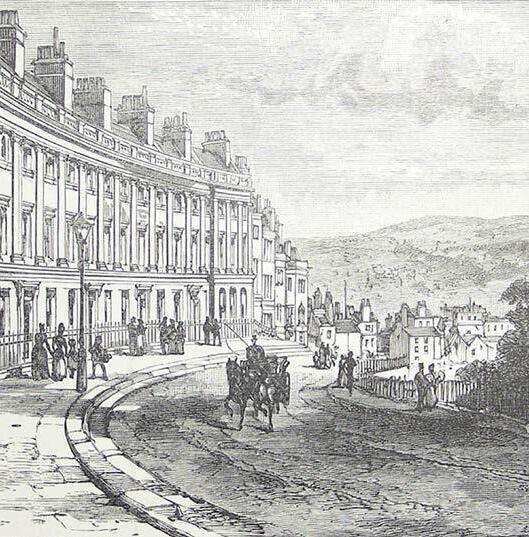
The trunk had belonged to a Dr. William Keeling, resident of Gay Street, who died in 2016.
The material secreted in the trunk includes letters, diaries and other 19th-century documents, as well as an incomplete manuscript, written by Dr. Keeling.
The manuscript brings together details of a former Bathonian, Bellerophon “Belle” Nash, whose life is fully documented in the letters and diaries but whose memory had been erased from history, for reasons that remain unclear.
According to Dr. Keeling, Belle Nash was a grandson of Bath’s celebrated master of ceremonies, Beau Nash. During the 1820s–30s, he had been a trailblazer in Bath, using his position as a much-loved city councillor to expose corruption and oppose bigotry.
EX-FT WRITER’S WORK.
The discovery of the trunk and its contents was made by Keeling’s nephew, William “Bill” Keeling, a former foreign correspondent on the Financial Times and also a Bath resident.
Having been gifted the trunk and other materials in his uncle’s will, Mr. Keeling has worked tirelessly on completing his uncle’s writings. His first volume of discoveries, Belle Nash and the Bath Soufflé, has just been published by EnvelopeBooks.
Mr. Keeling’s research has established that Belle Nash was at the centre of a small coterie of lady friends, including Gaia Champion, widow of the former solicitor Hercules Champion, whose impact on Bath’s legal infrastructure has also inexplicably been written out of the records.
Together with his female allies, Belle was able to reveal in 1831 the existence of networks of fraud pervading Bath’s legal system as well as human rights abuses by notable figures in society who visited Bath during “The Season”.
Mr. Keeling has, in addition, established that Belle was an enthusiastic bachelor, introducing to Gay Street a series of gay lovers who, in deference to the law of the time, were disguised as “cousins” and other family members.
Belle Nash and the Bath Soufflé will be the first in a five-volume series that looks at Belle Nash’s role in highlighting the attitudes of his time, often at consdiderable personal cost. The first book lays bare a condition of moral turpitude that other Regency Bathonians somehow overlooked.
Belle Nash and the Bath Soufflé is available to citizens of Bath, and to others further afield, at £9.99 from all good booksellers.
INTRODUCING BELLE NASH: REGENCY BATH’S GAY HERO Fighter for justice and reform.
Councillor belle nash is a controversial figure in Bath, courting as much love and adoration from his female friends in the Assembly Rooms as suspicion and contempt from more bigoted male members of the City Corporation.
He is, of course, a vocal critic of Guildhall corruption, and one whose bachelor habits have a tendency to polarise opinion and confuse the causes for which he fights with his own belief in personal liberty.
The redoubtable Mrs. Crust—pre-eminent pie-maker of Bath—is an unequivocal supporter.
“He is the hardest-working councillor in
HEART-THROB OF POLITE SOCIETY.
the city,” Mrs. Crust told our intelligencer, “taking on legal matters that have been allowed to fester for generations.”
Magistrate Obadiah Wood profoundly disagrees. “Mr. Nash is an interfering radical, with the temerity to challenge Bath’s happy status quo.
“As for his personal life, he is an abom-
ination. “Like all bachelors, he should be strung up, and he will be if I get to meet him on the bench.”
In recent months, Belle Nash has been seen in the company of his Prussian cousin, a Herr Gerhardt Kant, lately arrived on these shores from Königsberg.
Herr Kant has astonished Bath residents with the size of his powdered wig and the quantities of scented powder with which he dresses it.
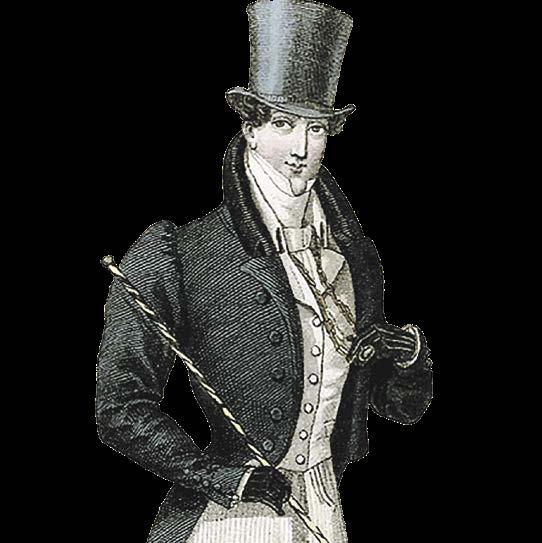
We hope to keep our readers apprised of the doings of all the above, and the company they keep, in the pages of The Gay Street Chronicle

PRINCESS VICTORIA TO OPEN NEW PARK.
MILLINERS REPORT STRONG SALES IN ANTICIPATION.
Bath city corporation has announced that Princess Victoria is to open Bath’s new public park.
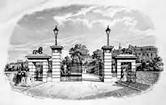
The building of a park has been an ambition of the Corporation for many years. From what we hear, it will soon be planted with exotic species.
It may attract them too. The Corporation has put the task of organising the park’s opening ceremony into the hands of Councillor Belle Nash, who is well known for cultivating exotic varieties.
BEAUTIFUL FOREIGNERS OBSERVED IN BATH.
Ribbon to be Cut.
Among the highlights of the opening of the new park will be a ribbon-cutting ceremony, in which a ribbon will be cut. The cutting will be carried out by Princess Victoria, who will wield the same pair of royal scissors as was used by her grandfather, King George III, for an earlier ribbon-cutting ceremony in the 18th century.
She will not be cutting the same ribbon, however. It will be a different ribbon, though equally ceremonious.
Music Hath Charms.
The boys’ choir of the Bath Abbey School has been booked to sing at the opening ceremony, and will be conducted by its music master, Mr Arthur Quigley.
Mr Quigley will, as always, be recognisable for wearing a tea cosy on his head, rather than more traditional headwear.
This is because, say wits in the choir, their conductor does not know how to conduct himself.
(According to The Chronicle’s Humour Editor, this is a play on words—“Does not know how to conduct, himself”, a quip so mirthful that we were obliged to take a pinch of snuff.)
A Word from our Chairman.
Asked by The Gay Street Chronicle to comment on Princess Victoria’s opening of the park, the Corporation’s 90-year-old chairman, Ernest Camshaft, said that he had lost his spectacles and therefore had nothing to say. He did however recall meeting King George III at some time in the past and looked forward to seeing the king’s scissors again.
PRUSSIAN EXOTIC SETS TONGUES WAGGING.
Canal-workers reserve judgement.
Keen-eyed residents of Bath will have noticed increasing numbers of foreign personnages in the city.

One such visitor is Herr Gerhardt Kant, handsome nephew of the famous Prussian philosopher Immanuel Kant.
Herr Kant is currently living in Gay Street with his cousin Councillor Nash, having travelled hither from Königsberg. He is an acknowledged expert on the breeding of European flora and fauna, and on the breeding of European royalty, he told me when we met at the Assembly Rooms a week ago.
“In bose cases, selection is needed to advance the species,” he said. “This is why the German prince, Prince Albert, has fine

and noble propotions while your Prinzessin Victoria ist ein midget.”
When I pointed out that Her Royal Highness is half-German, Herr Kant scoffed.
“‘Her Royal Highness,’ you say,” he told me; “I would razzer call her ‘Your Royal Lowness’.”
And with that, he rolled over on the floor and roared with impolite laughter, while more refined persons turned their backs and said nothing.
“I have ein Witz made and you stand around like a row of cabbages,” said Herr Kant, wiping his eyes. “Ze English are cripples.
“You all need mein course to take, on the
liberation of repression through regression. Two guineas per session and leave your clothes by ze door.”
Herr Kant was referring to his experiments into childhood regression, a type of therapy he believes is urgently needed by the English, who (he opines) exhibit the unhealthiest repressive tendencies in Europe.
Herr Kant is noted for his unfavourable views on everything English and his admiration for Prussia.
“The British monarchy, they are alle deutsch. and Friedrich the Great was ein großartiger gardener. I, however, am beautiful.”
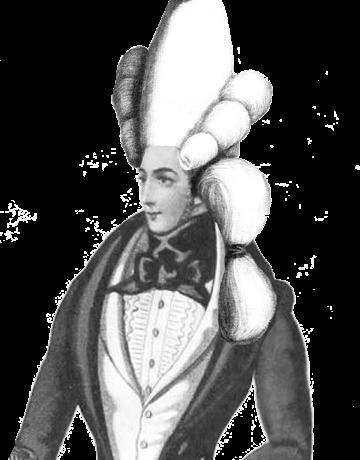
“Funny, clever, silly in the right way, and strangely moving in its unexpected ending. I love the alt-Regency Bath that Keeling has built.”
THE EDITOR’S PAGE.
The most reliable INTELLIGENCER for all Bath in which truth is prised from feckless gossip.
mrs gaia champion is now officially out of mourning, following the unfortunate death of her husband a year ago from the plague of cholera.
To mark the occasion, Mrs Champion held a supper to celebrate not her own re-emergence into society but the birthday of her good and honourable friend, Bellerophon Nash, whose manly looks laugh off his thirty-five years.
In attendance were Lady Passmore of Tewkesbury Manor, Mrs. Pomeroy of Lansdown Hill and Miss Phyllis Prim.
NO LAW FOR WOMEN.
We understand that Mrs. Champion is disappointed by the lack of positions for women in her late husband’s field the Law.
Before his sad demise, Mrs. Champion had worked closely with Mr. Hercules Champion to protect the Rights of Man— and Women—in Bath.
It is whispered, she feels she could carry forward his vocation, if only opportunity were forthcoming.
That, sadly, is an unlikely prospect in today’s Bath, even for those of us of a forward-thinking disposition.
Magistrate Obadiah Wood, by contrast, is satisfied with keeping the gentler sex at bay.
“A woman’s place is in the withdrawing room, playing—either a fortepiano or a hand of cards,” he says. “Give females access to the law and we would all be laced up in whalebones and crinolines. Divel take them!”
FELIX INFELIX.
Acat belonging to the Bishop of Bath & Wells became stuck in a croquet hoop Saturday afternoon last.
Among those present was Lady Passmore of Tewkesbury Manor, who found His Eminence spread-eagled on the palace croquet lawn, trying to force his cat, Horace, from the hoop.
According to Lady Passmore, Bishop George Monstrance had ordered a break in play so the cat could attempt to chase a mouse.
We understand that the episcopal gardener had tied the mouse to the hoop with a piece of string, to make it easier for the cat, which is overweight. “Horace swallowed the mouse whole, and then got stuck.”
Efforts to release the feline included tempting him with his favourite tincture of milk and Armagnac, to no avail.
A croquet mallet eventually proved efficacious.
PUBLIC NOTICES.
Mrs H Bakes Exceedingly Hard Cakes
Enjoy Mrs Haytit’s rock cakes at Mrs Haytit’s Tearooms, Abbey Green. Baked fresh every month. Crumpet on the side.
Martin Babbage
Tooth Surgeon and Barber
Teeth-pulling and a shave for less than a penny. Lead fillings extra. Located next to Hickory Undertakers.
Joshua Simpkins & Co
Four all yur printin rechoirmentts expurt typsetters. Fyunereal notices a specialitity. Alfo lokated next to Hickorys.
Porter’s Best Value Flour

Why pay more for flour when you can get it cheap with Porter’s Finest? As recommended by Mr. Cullen of Oldfield, supplier of cattle feed. Recommended also by Shirley Haytit (tearoom proprietrix), who testifies that Porter’s Finest (manufacturer: Mr. Hezekiah Porter) is what makes her rock cakes so hard and manly.
Bath’s Bachelors
The Flora & Fauna Society will be holding its Annual General Meeting for Bath’s Bachelors in the shrubbery by the pond in Royal Victoria Park at midnight next month. Umbrellas advised
MAGISTRATE’S CIRCULAR.
Last week, Magistrate Obadiah Wood, hereby, ruled as guilty:
Master Thomas Perry, aged 12, stealing an apple (fallen)—six months turning the crank in prison.
Mr Franklin Jones, aged 26, for poaching a rabbit—three years in a Workhouse.
CUSHION MANIA HITS BATH. POLITE SOCIETY IS THRILLED.
Mr ernest camshaft, Chairman of the Bath City Corporation, has issued a statement deploring the demand for cushions. This followed a warning of a run on cushions issued by Stuckey’s Bank.
Messrs. Croft and Lloyd, soft-furnishings managers at the newly opened Jolly’s store on Milsom Street, confirmed the news.
Mr. Croft declared himself that, “We have seen unprecedented demand for cushions in recent weeks. Such home accessories are put into service not only on chairs, but also on beds. We do not put cushions on beds at Jolly’s and we see no reason for the practice.”
The managers report that they will have no new stock until Thursday hence.
Disappointedcustomers.
The demand for cushions has split public opinion. Mrs. Pomeroy of Lansdown Hill is among Jolly’s disappointed customers.
“I put a couple of cushions on my bed a month ago and they looked wonderful nice. Now I have thirty-two on the bed and none left on the chairs. I feel badly let down by Jolly’s.”
Lady Passmore of Tewkesbury Manor, however, was more chary, describing Mrs. Pomeroy’s use of cushions as “not amus-
ing but typically selfish and quite possibly immoral”.
Lady Passmore reveals that she has told Mrs. Pomeroy that there should never be more than one cushion on a bed, and never for decorative purposes.
Miss Prim of Gay Street attests that cushions are conducive to happiness and that she has knitted and stuffed cushion covers for the Mineral Water Hospital for more than a year. Dr. Griffith, the Superintendent of the Hospital, confirmed that the hospital had been experiencing a surfeit of cushions, thanks to the enterprise of Miss Prim. “We appreciate Miss Prim’s kindly efforts,” Dr. Griffith noised to us, “but her cushions are not really suitable for hospital purposes. We are of a mind to offload them onto the abbey church.”
The suggestion was applauded by Lady Passmore of Tewkesbury Manor, who noted that “the abbey pews are deplorable hard.”
The public craving for cushions is said to extend beyond Bath, to Chippenham, onward to London and even to the distant dominions of the English Empire. No cushions have been reported in Radstock, but recently returned mariners affirm that some have been seen as far away as the Caribbean.
Messrs Croft and Lloyd, aged 43 and 46, for failure to supply a cushion on request to the Office of Magistrate—six months in Pulteney Gaol.
Mr Tobias Bailey of no fixed abode, aged 18, for having no fixed abode—transportation to, and hard labour in, Australia
Miss Florence Whately, aged 17, Maid—a fine of ten shillings for claiming goods sold to her by Mr. Hezekiah Porter were not fit for consumption.
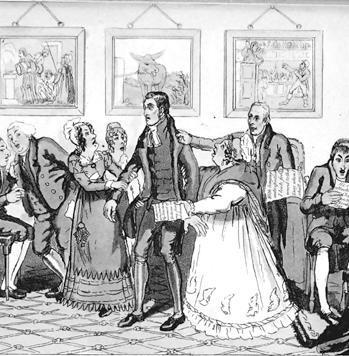
No defendants were found innocent because all were guilty, which should have been obvious without having to take up the court’s time.
Lost & Found Property.
Lost—Miss Phyllis Prim of Gay Street reports the loss of two balls of wool and a double-point knitting needle, from last Sunday’s 10 o’clock service at Bath Abbey.
Lost Mr Arthur Quigley, music master, has lost a set of spoons, but is pleased to report that he has found his Landolfi violin, which he had mistaken for a quill.
Found a pair of spectacles bearing the initials EC.
Correction: Dr Sturridge, who had previously informed The Chronicle that he had lost his marbles, now wishes it to be known that he has not lost his marbles. Dr Sturridge avers that his marbles, along with 223,612 other marbles, can be found approximately two miles north east of the city of Shangdu in Mongolia.
“By turns incisive, outlandish and hilarious! … there’s a brilliance in The Gay Street Chronciles, half-modern, half Dickensian.”
MATTHEW PARRIS
Mrs.Champion discards her blackcrêpe.
ALEXANDER MCCALL SMITH
LESS INTERESTING NEWS ABOUT THE ROYAL VISIT.
Mrs. Crust chortles.
Mrs. Crust, the proprietrix of Mrs. Crust’s Pie Shop on Abbey Green, hopes the forthcoming visit to Bath by Princess Victoria will provide a boost to trade.
“If Her Royal Highness would only honour me by dropping by, I’m sure that others will follow,” she told The Chronicle, when we paid a visit to her pie-lover’s emporium last week.
“Then I will call her my Pied Piper!” she added, chortling. We chortled too, but more politely, being of a higher social standing than the pie-maker.
Three ladies polled.
Apoll of three ladies indicates universal excitement at the visit of Princess Victoria to the city.
Lady Passmore of Tewkesbury Manor will be wearing her wedding jewellery for the occasion. She tells our intelligencer that this will remind her of the devotion of her husband, Lord Admiral Passmore, who has
been living in Jaipur for twenty years and is not expected to return.
The attendance of Mrs. Pomeroy of Lansdown Hill on the great day is not in doubt.
“In case dear Mrs. Crust runs out of pies, I will be having several cakes baked to mark the day,” she assured The Gay Street Chronicle
“A Battenburg Cake, to celebrate the princess’s German antecedents. And a Genoise, to celebrate the princess’s Italian antecedents. Also, a Seed Cake, in case of any other ante-seed-ents.”
Bunting of no medical use.
NEWS FROM QUITE A LONG WAY AWAY.
Explorers return to Bath.

All society is relieved to learn that local explorers Dr. Erudite Whittlemarsh and his wife Mrs. Tulip Whittlemarsh have returned to Bath following their latest daylong expedition.
Dr. Whittlemarsh and his wife had availed themselves of the clement weather to walk up to Combe Hay and thence along the Cam Brook river. The walk is a long one.
“We found people living a further two hours distance in a village called Peasedown St. John,” Dr. Whittlemarsh confided to The Gay Street Chronicle. “We had heard rumours of this village but can now thoroughly confirm its existence.”
their rustic utterances and quaint ways.
“The people of Peasedown St. John bespeak one big happy family,” bespoke Dr. Whittlemarsh afterwards, “named Hobhouse. They like to keep it that way, apparently.”
On their travels to these distant regions, the explorers witnessed farmhands at work, harvesting apples, collecting eggs and besporting themselves in sundry barns and haycocks. In his diary of scientific jottings, he noted, “The farmers have chickens and ducks. Both lay eggs that can be boiled, fried and scrambled. The rustic people like to be laid and scrambled too.”
Miss
Phyllis Prim, Bath’s foremost knitter, will be knitting two hundred feet of bunting, which she has offered to re-work into a patchwork quilt for the Mineral Water Hospital after the event.
We understand that Dr. Griffith, the Superintendent of the Hospital, intends to turn the offer down. He says he is not aware of any medical value in bunting, except perhaps as a swab.
Mrs Whittlemarsh had taken with her
Asked about future expeditions, Dr. Whittlemarsh recalled that, whilst in

a steak-and-venison pie, bought from Mrs Crust’s Pie Shop, and had asked her maid Mary to share her slice with the local countryfolk whom they encountered en route
While the villagers of Peasedown St. John betook themselves of Mrs. Whittlemarsh’s provender, Dr. Whittlemarsh betook himself of the opportunity to make notes about
Peasedown St. John, the name of another nearby habitation was bevoiced, viz. R*dst*ck. Great-grandfather Hobhouse, however, warned of dangers facing gentlefolk approaching what he said was “a vile, sinful place”. Dr. and Mrs. Whittlemarsh have therefore foresworn forevisiting R*dst*ck but to bevisit beother betowns instead.
“A real romp of a book – full of surprises!”
“Bravo. A rollicking tale of corruption, intrigue and romance. A racy read!”
PETER TATCHELL
A Reader’s Guide to Ukraine and Russia
Remarking on her novel A Sin of Omission (p. 17), the author Marguerite Poland comments “Had biography been my métier, I would prefer to have honoured the subject of my book with a meticulous history. But I am a novelist, and so I wrote a novel instead.” Poland does herself a disservice: her novel reaches out to us in ways that a history could not, as do the novels and short stories that follow. We are grateful again to Ľubica Polláková (LP) and Uilleam Blacker (UB) for their recommendations.
THE ORPHANAGE SERHIY ZHADAN
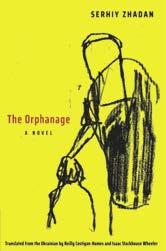
Yale University Press, 2021
Recalling the brutal landscape of The Road and the wartime storytelling of A Farewell to Arms, The Orphanage excavates the human collateral damage wrought by the ongoing conflict in eastern Ukraine. When hostile soldiers invade a neighbouring city, Pasha, a thirty-five-year-old Ukrainian language teacher, sets out for the orphanage where his nephew Sasha lives, now in occupied territory. Venturing into combat zones, traversing shifting borders, and forging uneasy alliances along the way, Pasha realizes where his true loyalties lie in an increasingly desperate fight to rescue Sasha and bring him home.
Recommended by UB
ODESSA STORIES ISAAC BABEL
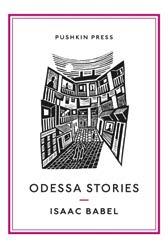
Pushkin Collection, 2016
Odessa was a uniquely Jewish city, and the stories of Isaac Babel—a Jewish man, writing in Russian, born in Odessa—uncover its tough underbelly. Gangsters, prostitutes, beggars, smugglers: no one escapes the pungent, sinewy force of Babel’s pen. From the tales of the magnetic cruelty of Benya Krik—infamous mob boss and one of the great anti-heroes of Russian literature—to the devastating semi-autobiographical account of a young Jewish boy caught up in a pogrom, this collection of stories is considered one of the masterpieces of 20th-century Russian literature.
Recommended by LP
GREY BEES ANDREI KURKOV
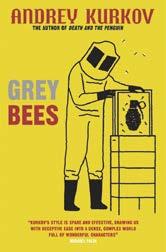
MacLehose Press, 2020
Little Starhorodivka, a village of three streets, lies in Ukraine’s Grey Zone, the no-man’s-land between loyalist and separatist forces. Thanks to the lukewarm war of violence and propaganda, only two residents remain: retired safety-inspector-turned-beekeeper Sergey Sergeyich and Pashka, a “frenemy” from his schooldays. Under the ever-present threat of bombardment, Sergeyich’s one remaining pleasure is his bees. As spring approaches, he knows he must take them far from the Grey Zone so they can collect their pollen in peace. This simple mission on their behalf introduces him to combatants and civilians on both sides. Wherever he goes, Sergeyich’s childlike simplicity and strong moral compass disarm everyone he meets. But could these qualities also spell disaster for him?
BABA DUNJA’S LAST LOVE ALINA BRONSKY
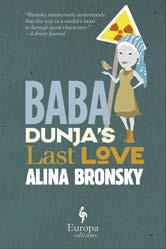
Europa Editions, 2016
Baba Dunja is a Chernobyl returnee. Together with a motley bunch of former neighbours, she sets off to create a new life for herself in the radioactive no-man’s land. In spite of the Geiger counter and irradiated forest fruits, the group finds everything it needs in its abandoned patch of Earth. Terminally ill Petrov passes the time reading love poems in his hammock; Marja takes up with 100-year-old Sidorow; Baba Dunja whiles away her days writing letters to her daughter. Rural bliss reigns, until one day a stranger turns up in the village, and the small settlement faces annihilation once again.
Recommended by LP
DEATH AND THE PENGUIN ANDREY KURKOV
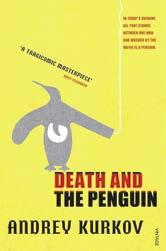
Vintage, 2003
Viktor is an aspiring writer in Ukraine with only Misha, his pet penguin, for company. Although he would prefer to write short stories, he earns a living composing obituaries for a newspaper. He longs to see his work published, yet the subjects of his obituaries continue to cling to life. But when, finally, he opens the newspaper to see his work in print for the first time, his pride swiftly turns to terror. He and Misha have been drawn into a trap from which there appears to be no escape.
Recommended by LP
LIFE WENT ON ANYWAY OLEG SENTSOV Deep Vellum Publishing, 2019
These autobiographical stories by Ukrainian film director and writer Oleg Sentsov are as much acts of dissent as acts of creative expression. Displaying a mix of nostalgia and philosophical insight, they look back at Sentsov’s opposition to Russia’s invasion and occupation of eastern Ukraine where he lived in the Crimea. He was sentenced to 20 years in prison in August 2015 on spurious terrorism charges after he was kidnapped in his house and put through a show trial by a Russian military court, marred by allegations of torture. Many of the stories included here were read during international campaigns to support the case for Sentsov across the world. Sentsov’s final words at his trial, “Why bring up a new generation of slaves?” have become a rallying cry for his cause.
Recommended by LP
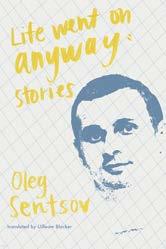
Dissent is currently under systematic attack across the political spectrum, with governments globally increasingly trying to curtail opposition to their policies from either their political adversaries or the public realm in general. Ideological authoritarianism is very much on the rise and in the process dogmatism, prejudice and bigotry are playing an ever greater role in public life. The signs of this cultural shift have been building up steadily for some time now and we cannot assume it is a mere passing trend: it needs to be confronted now and with a sense of urgency. Donald Trump may have been voted out of office, but the ideas he stood for are still in circulation and maintaining their hold on his large support base.
What is most striking about the turn against dissent that we are currently witnessing is the way that it has become so widespread in Western democracy, constituting a serious threat to its ideal of the free and open exchange of opposing political
A CALL TO DISSENT DEFENDING DEMOCRACY
AGAINST EXTREMISM AND POPULISM
STUART SIM
Softback
216 pages
May 2022
9781474494953
RRP £14.99
Our price £13.19 inc. free UK postage www.booklaunch.shop
EDITOR’S NOTE
Stuart Sim will be speaking at Glasgow’s Aye Write festival, a live programme of over 200 events at the Mitchell Library, held across three weekends between 6 and 22 May.
A Call to Dissent is a rallying cry to defend democracy from the evils of authoritarianism, prejudice, bigotry and apathy that have already taken root in Western democracies, and an appeal to challenge dogma and the urge to shut down disagreement.
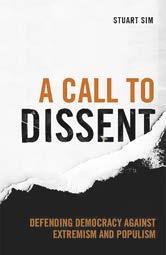
ABOUT THE AUTHOR
Stuart Sim is retired Professor of Critical Theory at Northumbria University and a Fellow of the English Association. Amongst his recent publications are The Lyotard Dictionary (2011), Addicted to Profit: Reclaiming Our Lives from the Free Market (2012) and Fifty Key Postmodern Thinkers (2013).
in the intervening years as the authoritarian impulse has grown increasingly confident in asserting itself.
Authoritarianism of this nature is at present particularly associated with rightwing governments and the resurgence in Europe and elsewhere of far-right politics, often with marked fascist characteristics, is beginning to pose a significant problem for liberal democratic polities.
At the same time, it has to be acknowledged that the left is just as capable of suppressing internal dissent as the right, yet again in the name of solidarity, and populism only too frequently exacerbates that tendency. I would argue that party unity is an overrated condition that holds back the cause of dissent, and without dissent you do not have a properly functioning democracy. It needs to be recognised as well that dissent within political parties is just as important to democracy as dissent from opposition forces without. If we are not even allowed to voice dissent on politics
down opposition, and any that exists has to proceed with the utmost care, knowing how little respect for civil liberties and human rights their governmental machine has.
Opposition is not for the faint-hearted in such cases, where it can often lead to prison or forced exile (sometimes even death, as with the dissident Saudi Arabian journalist Jamal Khashoggi, murdered in his country’s consulate in Istanbul in 2019 in a graphic illustration of autocracy’s utter disregard for public opinion).
China has kept up the tradition of authoritarian Communism and its contempt for dissent, as pioneered by the Soviet Union, regarding almost any opposition to the Party’s policies as treasonous—as the residents of Hong Kong have been finding out to their cost in recent years, their promised freedoms in the aftermath of British colonial rule, under their own elected ruling council, being progressively curbed to the point where they mean very little at all any more. Lockdowns, in the form of curfews,
I dislike what you say and I’ll reject to my death your right to say it
outlooks that is so basic to that system.
Administrations such as those of Donald Trump and Boris Johnson, for example, have targeted the judiciary and the media industry for being critical of their policies, dismissing them as little better than enemies of the state and seeking to bring them under their control. Lawyers have been singled out in the UK as well, for the apparent sin of representing refugees. Similar tactics have been applied in Russia, Hungary and Poland, and in several other countries around the world such as Brazil. Checks and balances to their exercise of power are considered unacceptable by those governments and the notion of opposition denigrated, even to the extent of eradicating dissenting voices within one’s own political party, no matter how mild in tone they may be.
Solidarity of belief is insisted upon and criticism outlawed within the ruling party set-up: to step out of line is to risk being ostracised by one’s colleagues or hounded out of the party altogether, a serious situation for a career politician to have to face. Boris Johnson has been quite ruthless in purging the Conservative Party of MPs who oppose any of his policies, and Donald Trump simply fired any of his staff who questioned his actions, even only recently appointed ones—right up to the very closing days of his presidency. In both cases that sent out a very clear message about the level of loyalty expected.
Although the Brexit campaign and the Trump presidency originally pitched themselves as dissenting movements against the establishment, both soon took on an authoritarian character that brooked no opposition, often defining it as treasonous and encouraging the development of a narrow-minded populism that is distorting the political process through its embittered intolerance.
Populism disdains opposition—any opposition. Dissent, as a study published in the aftermath of the 9/11 attacks in America put it, can be a distinctly “dangerous” activity to engage in, and it has become ever more so
as currently practised then we cannot get to the stage of trying to alter our adversary’s mind, or doing our best to understand their point of view. That is the sad situation in which we now find ourselves.
This study offers a robust defence of dissent, a polemic on its behalf, treating it as an essential part of any civilised society, without which that society is only too likely to ossify into an authoritarian, frequently totalitarian entity with minimal regard for human rights and civil liberties in general.
Authoritarianism East and West
We became used to the authoritarian style of Communist regimes over the history of Soviet Communism, which has left a legacy of that style in the non-Communist Russian state that emerged after its downfall in the 1990s. As it stands, Russia is little better than a travesty of democracy, without properly free elections or oppositional politics, where dissenting voices are ruthlessly quashed by an autocratic and distinctly oligarch-friendly leadership. A suspicious number of opponents of President Putin have been poisoned, for example: yet another very clear message about the level of loyalty expected to one’s leaders.
The Soviet period and the Tsarist regime before it have left little in the way of democratic principles behind them, with the result that Russians in general have never known anything very different, politically speaking, and are more or less resigned to it by now. The authoritarian imperative has survived as well in the old Soviet satellite states of the Cold War era in eastern Europe, most notably in the case of Poland and Hungary. There, human rights have been curtailed quite sharply and opposition systematically marginalised and victimised, despite the fact that this puts them at odds with their other partners in the EU, whose complaints over this manifestly anti-democratic behaviour have been largely ignored to date.
As with the Soviet Union, the lack of any recent history of democratic politics has made it easier for the governments to close
were occurring periodically in Hong Kong even before the pandemic struck, the target being street protests calling for a more democratic political set-up; these were brutally put down by the authorities, acting as directed by the central government in Beijing. Resistance from the Uighurs has been summarily quashed by the Chinese government as well and Tibet remains a source of disquiet under Chinese occupation. It may have permitted a certain amount of capitalist enterprise to exist in the country, a pragmatic move to boost the economy and make it competitive internationally, but there is no doubt that the Chinese Communist Party (CCP) is in complete control of Chinese life and dictates what happens there; if capitalism exists, then it is on the terms of the Party. The CCP is the sole legal political organisation in the country and gives little indication it has any intention of altering that system; political debate, such as it is, has to take place within the Party itself, which is highly secretive about such matters (as Communist parties traditionally have been), always concerned to present a face of unity to the world.
The “Arab Spring” was an example of a simmering dissent in the Islamic world, which is traditionally inimical to that phenomenon, and it is still there despite heavy-handed government crackdowns in response—the “Arab Winter” as it has come to be called. Then there is the long-running tragic saga of the Palestinian people, whose dissent against their loss of territory as a result of the creation of the state of Israel in 1948 has drawn a harsher and harsher reaction from the Israeli authorities down the years. Not harsh enough, however, to prevent dissent from continuing to flare up. Dissent can and does arise in all political systems, therefore, irrespective of their ideological orientation. Authoritarianism can and does arise in all political systems too and the focus of my argument in this study is on how that tendency can be countered. What we desperately need now is a mainstreaming and normalisation of dissent throughout all political
One of my father’s clients had been appointed administrator of a former collective farm in the north of Transnistria and he invited me to spend a few weeks there with him in the summer, right on the frontier between Romanianand German-occupied territory. For the most part, the frontier ran along the river Bug but the Germans had made a deviation to take in the site of some sugar factories on a tributary, the Rov. As a result, the collective farm, Kazatchov, looked straight across the smaller river to swastikas flying over the little town of Brailov. My father’s friend said how charming the commander
The Kazatchov farm basked in an anachronistic dream of contentment. It was summer. There was hope in the air—for a future free from the Communist nightmare of deportations and famine. Relations between the Ukrainian peasants (old men and youngsters as usual) and the Romanian soldiers, also peasants, were easy and relaxed. The house with its white-washed walls was comfortable and clean; you could almost imagine you were living in a novel by Turgenev.
The all-powerful German administrator of Brailov, on the other side of the Rov, was called Schmitz and we saw him almost every
well off: they could receive food and medicines from home—as long as they paid full price for them—and there was very little surveillance. United in their sense of the unfairness of things, they had given up any thought of escaping: where would they go in a country ravaged and brutalised by war? Underneath it all, though, they were paralysed with fear of what the Nazis might have in store for them. I did what I could to calm their fears and left them, saying I would see them again soon. ‘Soon’ turned out to be a year later, when they were returned to Bucharest.
On our way back to Kazatchov, the cap-
filled the air, which shimmered in the heat like gin or over-limpid water. Schmitz came to Voucol’s house for a cup of coffee after lunch and then we walked together across the 200 yards or so to the little garrison at the Romanian customs post. I kept wondering what it was all about. The German’s jaw was fixed and he looked straight ahead all the time. He sat down on a bench in the little garden at the customs post and lit one cigarette after another. The sun glinted off his shiny black boots. I went into the office to find the Romanian captain of the garrison, who was deathly pale. He told me that the Jews from Brailov whom
In Communist Romania, no good deed ever went unpunished
of the Brailov garrison was. This looked like a heaven-sent opportunity for me to carry out a little personal investigation. My cover would be perfect: just an ordinary visitor, no need for explanation. I didn’t want to waste a moment in getting there.
I left Bucharest for Kazatchov on a fine evening in July and by next morning, as the train ambled across Bessarabia, it became very hot. I remember the station buffet at Tiraspol station, its tables thickly encrusted with flies, living and dead. I had to change trains at Razdelnaia: even more flies, no water. The station had been blown up by a bomb leaving only one wall standing, like a piece of stage scenery; beyond it I could hear the rumbling sound of a country market and I had time to dash down there and swap some tobacco and a battery (much in demand) for a tasty bread roll and a piece of cheese.
My new train, made up of dilapidated coaches salvaged from some Romanian dump, trundled north, lurching at each joint in the rails, and arrived late in the evening at Zhmerynka, which was an important railway hub, since it was the last Transnistrian station on the line to Kiev. It too had been bombed during the invasion and was dark and half in ruins. Voucol, my father’s friend, was waiting in a pony trap to take me to the farm, about six miles away. Also in the neighbourhood was the small town of Mohilev where, on orders from Berlin, Antonescu had interned a number of Jews. I had money and messages for several of them and Voucol promised to arrange a visit for me.
EDITOR’S NOTE
When George Tomaziu was invited to spy for Britain, in fascist Romania, he agreed because Britain then represented the only bulwark against Nazism. He went on to monitor German troop movements, observing, on one occasion, the masskilling of Jews in the Ukrainian town of Brailov. He knew he might be arrested, tortured and killed by Romania’s rightwing regime but thought that if he survived, his contribution to the war effort would be recognised. It wasn’t. After Romania turned Communist, he was sent back to prison in 1950 and kept there for 13 years.
day. He was correct and civilised, fond of symphony concerts, which he felt deprived of ‘in this barbarian country’. Every time he came he brought a bottle of Champagne or Armagnac (a kindly gift from the French to the Wehrmacht). There were four of us, with Voucol and the captain of the Romanian frontier guards, and we played poker for low stakes so that I could afford to lose and this made them like me. Schmitz was awaiting an inspection team from Kiev and one day he invited me to come along to see ‘a pruning exercise’ he was going to undertake a few days later. I was puzzled and he smiled conspiratorially at me, certain that he had expressed himself in impeccable French. I had no idea what he meant.
At the same time he promised to give me a permit to go to Vinnitsa, the nearest big town under German occupation and known to be a transport hub, where, I explained, I wanted to look for old books and second-hand paintings. I might also, I said, find some inspiration for my own painting.
In the meantime the Romanian captain took me by car to Mohilev so that I could visit relatives of those Jewish friends of mine who were interned there. The whole town had been turned into a sort of concentration camp. It was strictly illegal to make contact with the inmates but it didn’t cost much to get the guards to turn a blind eye and, accompanied by an officer, I was able to move about quite freely. The internees were living in abandoned or requisitioned houses and were very fed up with being removed from their normal way of life. That apart, they were relatively
ABOUT THE AUTHOR
George Tomaziu was the godson of Georges Enescu, Romania’s most celebrated composer and musician. Nothing in his early life suggested the toughness needed to withstand abuse. On the contrary, his pleasureseeking expressed itself in a voracious bi-sexuality. At one point during the war he was made artistic director of the Odessa Opera; a year later, he was being held in Romania’s most notorious prison. He died in 1990.
tain took me through Zhmerynka to see the ghetto into which the local population of Ukrainian Jews had been crammed. Behind barbed wire and well guarded by police, I saw crowds of poor wretches, in rags, dirty and hardly able to stand upright: men and women of all ages. They stared at us as if hypnotised, past all hope for anything from anybody. My guide to this descent into the depths of misery told me that there had been outbreaks of typhus and dysentery and that the inmates had pulled their wedding rings from their fingers and torn out their gold teeth to buy small improvements to the terrible conditions which they were suffering, simply because they were Jews. Only one local Jew had been spared, said my guide: the former ‘fixer’ who had become Schmitz’s adviser and lived as he pleased.
But there was another circle of hell. On their arrival in Brailov, the Germans had organised a massacre of the Jews, as was their custom. About a thousand had managed to escape to apparent safety on the Transnistrian side of the Rov but through sickness and starvation only about a third of them were still alive. They were guarded separately as ‘foreigners’ and were even more spectral than the others. Horror engulfed me. I could no longer believe what my eyes were seeing or feel what my reason told me was true.
The day for Schmitz’s ‘pruning’ excursion had arrived. He had renewed his invitation the evening before, after an unusually tense game of poker.
The sun shone brilliantly and birdsong
SPY ARTIST PRISONER
MY LIFE IN ROMANIA
UNDER FASCIST AND COMMUNIST RULE
GEORGE TOMAZIU
EnvelopeBooks
Softback, 230 pages
March 2022
9781915023049
RRP £12.99
Our price £9.99
inc. free UK postage www.booklaunch.shop
I had seen in the Zhmerynka ghetto were about to arrive under escort. Schmitz had ordered their return to their native town. Someone had telephoned when they were leaving Zhmerynka and they should therefore reach the banks of the Rov where we were waiting at about three o’clock.
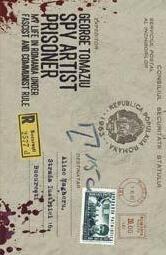
Shortly before three, a squad of four German soldiers and twelve members of the recently recruited Ukrainian militia, all very young, wearing new black uniforms and armed with automatic rifles, marched down the hill from Brailov under the command of a German sergeant. Four of the militia held large black police dogs on leashes. The squad drew up behind Schmitz, who stayed motionless, his eyes half shut. Then, without looking at his watch he shouted in German, ‘It’s three o’clock! They should be here.’
It was as if it was a signal. We saw the first dark shapes appearing on the road from Zhmerynka, flanked by Romanian gendarmes. In a few minutes we could see them all, an untidy procession of tottering humanity in a cloud of dust thrown up by the gendarmes’ boots. Most of them were shoeless, a few had wrapped their feet in rags or bits of leather—no protection at all against the hard surface of the sun-baked road. Schmitz stood up and waited until they were all assembled in front of the building. Not a word was spoken; it was as if we had all lost our voices. The birdsong had turned into screeching, made unbearable by the ringing in our ears. In a parched voice the captain began to read names from a list.
continued in the book
During the final months of 1981, Mary had asked her remaining friends for help and advice about how to die. One friend offered to be with her when the time came. Another passed her a substantial quantity of a sedative and then got frightened and would not help her go through with it.
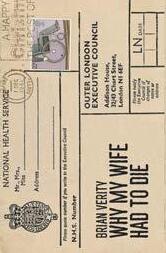
Mary told me of an occasion in November when she spoke seriously to a third friend who, no doubt uncertain how to answer, tried to brush her fears aside by telling her that she had years to live. This may have been true but Mary could not be consoled by the idea of protracted degeneration.
own unsteadiness, she had had difficulty in pulling him away and had not done so before the shopkeeper had angrily complained to her. The dog was in his fifteenth year and geriatric. He and Mary were a terrible sight whenever they set off together, both swaying and staggering from side to side.
During these months, Mary became even more careless when crossing roads. This was not a symptom of the damage done to her mind but the product of her wish to stop living. She also refused to wear a seat belt in our car, in case it prevented her death in an accident.
who is slow to learn.
Although I have written of Mary’s increasing lethargy, it was significant that, following my tuition in the lounge or garden, her demeanour would change radically. The lethargy would disappear entirely and so would her vacuous expression. The other symptoms would lessen and she would briskly do the household chores and dress for the dance. With another husband, one capable of showing her the concern and interest that I only showed when teaching her dances, her life would have been less intolerable.
At the Saturday evening dances, Ewan
recount, which caused shame and embarrassment to Mary, who was always well aware of what had happened.
Ewan and I could find no excuse for this behaviour. The preparatory work that we put into the dancing ensured that, under our direction, Mary rarely disrupted a dance. This could not be said of many others, including some who avoided her. Instead of the praise and encouragement that were her due, she was met with social ostracism on the dance floor.
This cruelty and insensitivity, plus the wrongs done to us by our country, led us to ignore the customary closing cere-
Huntington’s disease is a life sentence. Should we be able to shorten it?
WHY MY WIFE HAD TO DIE BRIAN VERITY
EnvelopeBooks
Softback
214 pages
3 March 2022
9781915023032
Amazon price £13.51
RRP £12.99
Our price £9.99 inc. free UK postage
www.booklaunch.shop
These words, and those of other people, only increased her isolation. She realised that she could not depend on anyone and would have to kill herself unaided.
Not wholly in control
As 1981 drew to a close, Mary’s lethargy increased and her reactions became slower. When entering the house, her tendency to stand for long periods in the doorway, with a vacuous smile as she took in the scene, became worse. Often I would exclaim irritably ‘Come in, then!’
She also seemed to take longer to light her cigarettes. With growing anger, I would watch her incompetently fumble to get out a cigarette and put it to her lips. Then, long seconds would pass while she repeatedly flicked her lighter until it ignited and next, most maddeningly of all, would hold the burning lighter for more long seconds, having apparently forgotten why she had lit it, before finally putting the flame shakily to the cigarette and inhaling. Too often I would scream ‘Light it then, light it!’ during this prolonged operation. Her face would go tense, except for her lips, which she would repeatedly purse with anxiety.
Mary sometimes mentioned incidents about going shopping alone in the high street. Once, her unsteady gait had caused her to bump into another pedestrian with some force and she had been verbally abused and accused of being drunk. On another occasion she had gone into a pet shop with the dog and he had started to eat out of an open sack of dog biscuits lying on the floor. Because of his great size and her
EDITOR’S NOTE
Huntington’s disease is terrifying. It leads to total physical and mental deterioration. There is no cure. It is handed down genetically, with a 1:2 chance of inheritance that cannot be determined until the disease shows itself, often not until the sufferer is in their 40s.
Many do not know they have the gene and that they risk passing it on. Those who do know, because a parent or sibling has suffered from it, may wait a lifetime before finding out whether they are safe or not. The prospects are horrific.
After his first marriage failed, Brian Verity had a breakdown and married the woman who nursed him back to health in a psychiatric unit. Within a few years, she began showing signs of Huntington’s that he had seen in other members of her family and that he had a morbid fear of.
Having fallen in love, Verity — no saint — now found himself falling out of it, furious at the cruelty of fate, afraid of his own inability to cope and exasperated by society’s unwillingness to grasp what he saw as the vital need to protect the as-yet unborn and to offer a way out by legalising assisted dying.
Verity’s angry memoir is not an easy read and does not sit well with our liberal instinct. But what are the right answers?
’Tis the season to be angry Christmas came but did not bring us any peace. The pervasive air of pleasurable anticipation in the days leading up to the holiday served only to irritate me, and the sentiments spoken by Christians were not only irrelevant, but offensive to us.
We had been invited to spend the day with Edna Miller and her husband Bill but I refused to go. My emotions were turbulent and I would not be able to feign conviviality so Mary went alone.
Edna’s daughter, Cathy, drove her home late in the evening. Cathy had turned to religion a year or two earlier, becoming a born-again Christian. As she drove, she urged Mary to ‘Turn to Jesus because only He can save you from Huntington’s.’ When Mary told me this, I telephoned the Millers immediately and launched into a vicious diatribe. Christmas Day ended, as it had begun, with my uncompromising rejection of other people’s misplaced philanthropy.
Mary as a role model
Throughout 1981, Ewan, Mary and I continued with the Scottish country dancing. I have never heard of anyone who not only took up Scottish country dancing after being diagnosed with Huntington’s chorea but progressed to master it, as Mary did in concert with Ewan and me.
And Mary’s enthusiasm for dancing never flagged. She was always grateful to me when I walked her through new or difficult figures at home, in preparation for a dance. Unfortunately I sometimes got very impatient with her, as one gets with a child
and I partnered Mary alternately but, in addition, one of our friends took to partnering her for at least one of the dances on each occasion. During 1981, a fourth dancer, with whom we had had no previous connections, also began to partner Mary. Both Winston and Robert gave her the respect and attention that helped to alleviate her painful awareness of being an outsider.
Mary was quite unselfish at the dances. If Ewan was not with us, she would press me to ask other women to dance, in order to give me a change from constantly partnering her. If I did, inevitably she would be left to sit out. Ewan and I accepted that few men would feel capable of partnering Mary. She did need the occasional reminder and guiding hand, even in the most familiar dances, but in the more complex ones it required complete knowledge, a wide range of signals and fierce concentration to direct her through them. There was, too, her appearance. She was attractive by any standards and her personality was sweet and affectionate but, like all victims of Huntington’s chorea, she did look odd—and decidedly so on the dance floor.
The spitefulness of the popular
But we did not accept, or find it easy to forgive, those dancers who avoided dancing in her set. They would not line up below Mary and would walk by a square set when they spotted her in it. Most cruel of all, there were times when a couple would leave the line above her after the numbering into sets had taken place, if they saw that they would be with her. There would then have to be a
mony at dances, when ‘Auld Lang Syne’ was sung and people stood up for the national anthem. The dancers’ bad behaviour went unchecked and their wrongs went unacknowledged. It would have been hypocritical of us to have joined in these ceremonies, which symbolised good fellowship and patriotism that we were not shown and did not feel.
In the liberal metropolitan atmosphere of the city, our expression of protest always passed unremarked but at a dance in a rural backwater on another occasion, our recalcitrance was carefully noted. At the next dance I attended, the MC had the temerity to threaten that, if I did not stand up during the national anthem, I would be banned from all their dances in future. Naturally I did not comply and, as usual, quietly changed out of my dance shoes while the anthem was played. A dance committee member appealed to me afterwards to be, as he put it, reasonable.
I wrote a long letter to him a week later, explaining my position. He never replied. I have not been to a dance there since that date.
1981 was the International Year for the Disabled but it had not afforded Mary the slightest benefit, nor had it led to any public understanding or concern for her terrible plight.
Who’s going first?
There were times, when I was with June, when Mary was unable to suffer my absences in silence. Her reproaches often drew noisy exple-
In 1870s South Africa a preacher tries to reconcile faith and broken promises
It had been an unseasonably wet and windy December night in 1878 when Stephen’s brother Mzamo had come to Stephen’s parsonage door— unannounced—to warn him of the danger to the bells. It had been startling to see him carrying a stick and spears, a fusty old jacket keeping out the cold beneath the folds of an ochred cloak.
Stephen knew that jacket well. It had once belonged to Albert Newnham, worn with a nosegay in the buttonhole whenever he had gone to visit Miss Unity Wills. Now it was mud-streaked and shabby, the buttons lost, the sleeves too short for Mzamo’s long arms. Gone, too, were Mzamo’s tailored trousers, the stiff collar, the white waistcoat, gloves and cane, the rakish bowler hat he had worn when Stephen had seen him last.
And yet, there was something magisterial about him now. An innate authority and grace.
‘Come in, brother,’ Stephen had said in a low voice, standing quickly aside to let him pass, closing the door behind him and turning the key. ‘Did anyone see you?’
Mzamo shook his head.
The greeting was brief and then Mzamo had walked to the furthest wall of the small room and gazed at the framed photograph of the Missionary College in Canterbury, his head on one side, saying nothing, just touching it with his stick. He could have lifted his weapon and smashed the glass. Stephen had half expected it.
‘They chose you instead of me,’ Mzamo said.
Stephen inclined his head.
Mzamo had glanced at him then. ‘I’ve learned not to believe the lies of Englishmen.’
Stephen did not contradict him.
‘You say nothing, Malusi—just like them. That, I think, is the same as a lie. The choice of a coward.’
‘I heard that you had joined the rebels,’ said Stephen. ‘At first I did not believe it but now I see it’s true.’
‘We are not rebels. We are soldiers fighting for our land.’
Again, Stephen did not contradict him, his dark suit and clergyman’s collar sombre in contrast to the ochre of his brother’s robe.
‘You should be fighting for your father’s people,’ said Mzamo. ‘There are others from Grahamstown who have joined us. Gonya Sandile. The Duke. Julius Naka. They know where their duty lies. Why should you support the Church when it has not supported you? They promised you an English missionary to work with you and here you sit alone like a hen on a nest without eggs. Where is he, that missionary? They say they will pay you as they pay the other clergymen—yet I know you earn half. They say they will ordain you priest when you can pass an examination in Greek and Latin. But here you are, still only a deacon, with no one to teach you. They send you to England where your comrades die from consumption like cattle with lung-sickness and yet they told us we would be healthy if we were chosen to go. All lies.’
Stephen had remained silent, the small flame of his hearth flickering and send-
ing the shadow of Mzamo up against the whitewashed wall, subverting the neat arrangement of the pictures he had framed from the Illustrated London News, sagging now from the damp in the plaster. ‘Brother,’ he had said at last, ‘you may no longer be a Christian and we may not serve the same God but I ask you not to doubt my Faith.’
‘There is one God,’ said Mzamo. ‘Mveli-Nqangi. He is not an Englishman.’
‘Nor am I.’
‘You are no longer a Ngqika.’
No: he had not been circumcised, he had not been mkhwetha, he had not learned the lore of manhood, the rituals of an heir. Nor did he know anything beyond the rudiments of Greek and Latin, the sole barrier to his ordination and the only hurdle to be overcome.
But where would he learn them on this barren hillside with his promised mentor, Albert Newnham, so far away and pre-occupied with minding a mission, with preaching and ploughing and raising a child?
A promise had been broken—the bargain between the Warden of the Missionary College in England and themselves: that Stephen would teach Albert Xhosa and Albert would coach Stephen in the Classics.
The perfect partnership. Comrades in their great crusade.
But Albert had always been less than diligent. ‘Let’s go and play cricket,’ he would say, rummaging for his bat and ball as Stephen appeared with his primers. ‘There will be lots of time to teach you Latin at the mission. We will have nothing to entertain us in the evenings and nowhere to go.’ And because Stephen was so skilled a bowler and loved the chance to throw off his jacket, flex his arms and stride out across the field, he had always acquiesced.
Mzamo had seated himself on the only chair in Stephen’s parlour while Stephen prepared a pot of tea, glancing furtively through the window, afraid of watchers in the yard. Mzamo had held his fighting sticks across his knees—alert—and shifted his blanket on his shoulder. ‘There is nothing I can do if our kinsmen smash your bell,’ he said.
‘I have no bell to smash.’
‘A church without a bell?’ Mzamo laughed.
That old derision, that vexing patronage. Stephen glanced away, said, almost apologetically, ‘You are a mission-educated man, Mzamo. How can you allow it?’
‘I am not a chief ’s son to be obeyed, like Duke or Gonya.’
‘One thing I beg,’ Stephen said, despising his age-old tone of supplication when speaking to his brother. ‘Even if they burn my church and turn me out because I have no bell, ask them to spare Albert Newnham’s mission.’ He cast about, acutely conscious of a possible disloyalty. ‘He’s a good man. He will never be a threat to your cause.’
‘As you well know,’ said Mzamo, ‘I have my own reasons for sparing Mr Newnham and his bell. Moreover, I have every intention of returning the money that I owe him. I will take it myself, despite the risk. As I am not an Englishman, I do not forget my obli-
gations.’ Mzamo looked directly at Stephen. ‘Not to your friend, Albert Newnham. Nor to my son and his mother.’
‘Or perhaps,’ Stephen retorted, his voice rising at last, ‘it has little to do with obligation. Mhlawumbi sisazela.’
An unquiet conscience.
‘No, Mntakwethu! It is you who have an unquiet conscience and know that you have failed our father’s house. It is you who have forgotten your language. Even now, when you speak, you sound more like a white man.’ Mzamo paused. ‘Or an Mfengu. ‘The intended insult stung. ‘Yes—you are just like the other Amahlungulu, with their white collars and their black suits.’
White-necked ravens, collared priests, cawing from their pulpits.
Stephen turned away. Was his deacon’s work to feed on carrion—the dregs and remnants of his people, devastated by war, torn by different loyalties, yoked by their dependence for work on farmers, tradesmen? Missionaries?
Mzamo gazed at him with shrewd appraisal, so familiar and yet so disconcerting. ‘Our father,’ Mzamo continued, ‘always had you weighing on his heart. Up until the day he disappeared he had our mother crying, “Why did you give up my son to the missionary? It would have been better if he had died than to be lost to us, a vagabond, never herding his father’s cattle.” And our father said, “There are no cattle in the byre to herd.”’
‘Perhaps their loss was greater than the loss of his son,’ Stephen had replied.
‘Perhaps it was.’
Perhaps it was.
Stephen knew this. He knew the loss had been greater. It was a burden he had carried since he was a child of nine, abandoned at the mission after Basil Rutherford had sent out the catechist, Mjodi, to enquire if anyone had missed a boy.
Shrewdly, his father, Mzamane, had claimed him as his son, parleyed through Mjodi when Rutherford’s Xhosa failed him, then retreated, giving him into the care of the priest and his acolyte.
Stephen had been too young to grasp the exigencies of need and opportunity, the logic of his abandonment. He had only watched in wretchedness as his father had walked away, a gaunt shadow-man, taking the wagon track that led past the door of the church. He had never heard his mother’s keen lament, the fearful ubulanzi—the unassuaged and lonely longing—for her younger son. But it was something that he knew himself.
Ubulanzi. The word defied translation.
His father had simply said to the missionary, Rutherford, ‘There is no food.’
‘I am hard-pressed here,’ Rutherford had replied. ‘There are so many who are starving. I have thirteen children already.’
‘We are being banished from our lands,’ Mzamane had continued. ‘We have been told to leave our homesteads and go beyond the Kei River. Where will our goats and sheep graze? Where will the cattle that are left find pasture? We leave behind the graves of our people continued in the book
A SIN OF OMISSION MARGUERITE POLAND
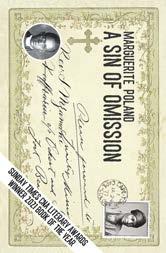
A Sin of Omission
EnvelopeBooks
Softback, 420 pages
5 May 2022
9781838172039
RRP £12.99
Our price £12.47
inc. free UK postage
www.booklaunch.shop
Winner, Sunday Times (South Africa) CNA “Book of the Year” Award, 2021
EDITOR’S NOTE
Torn from his parents as a boy in the late 1860s, Stephen Mzamane is picked by the Anglican church to train at the Missionary College in Canterbury and then returned to South Africa’s Cape Colony to be a preacher.
He is a brilliant success, but troubles stalk him: his unresolved relationship with his family and people, the condescension of church leaders towards their own native pastors, and That Woman — seen once in a photograph and never forgotten.
And now he has to find his mother and take her a message that will break her heart.
In this raw and compelling story, Marguerite Poland employs her considerable experience as a writer and specialist in South African languages to recreate the polarised, duplicitous world of Victorian colonialism and its betrayal of the very people it claimed to be enlightening. A masterpiece — and worthy awardwinner.
READER’S COMMENT
John Mbangyeno: An emotional roller-coaster — the astonishing love-story of a man for a church, an ideal and a woman. Heart wrenching.
Sponsorship opportunity for patrons
This season, we invite would-be patrons to help support an honest linguist to bring the fruits of his wisdom to the attention of the many. Bart O’Fehfon’s Lingualia column has been entertaining Booklaunch readers for ten issues and we think it’s time he had his own book. In a consumerist society, images are easier to absorb than words — and more profitable — especially as the dictatorship of the visual depresses our sensitivity to the verbal. But since we still use words, it’s good to understand how they work. And here, Bart is a master.
LINGUALIA A FANCIFUL EXPLORATION OF LANGUAGE’S FUNNY LITTLE WAYS BART O’FEHFON
EDITOR’S NOTE
Bart O’Fehfon is intoxicated by the untangling of word structures, and we find his intoxication contagious. That’s why we love it when he alerts us — gently but forcefully — that words like my, your, our and their are not “possessive pronouns” but “possessive determiners”, “possessive pronouns” actually being mine, yours, ours and theirs We like authors who know a thing or two; but funding is short. If you can sponsor part of this book’s production cycle, we’ll honour you in the patrons’ list.
A LENTEN RIFF
As we make our way through Lent (what do you mean ‘we’, pal?), it’s worth reviewing its origins—etymological, that is. A common assumption is that Lent is based on the springtime lengthening of days. (In Dutch, the word for spring is lente, and in poetic German it’s Lenz.) But things are not quite so straightforward. In early Middle English the term was lenten and in Old English it was lencten, ‘spring’, which probably derives from a proto-Germanic compound. The roots of that compound are related to length and the Latin dies. (The word day, btw, is completely unrelated to dies.) The form lenten is still current in Lenten fare and Lenten sacrifice and Lenten rose (though it’s possible that Lenten in these phrases is just Lent + the basic adjectival -en suffix).
The day before Lent is Shrove Tuesday aka Fat Tuesday or Mardi Gras. Why fat / gras Tuesday? Two possible explanations: —it’s the day that you eat up all the remaining fatty foods in your larder, so that they don’t go to waste during your Lent deprivations during the next 40 days (well, 46 days really);
—more metaphorically, it’s a day of self-indulgence prior to those upcoming deprivations.
The French gras derives from Latin crassus, influenced by Late Latin grossus the sources of the English crass and gross respectively. Somehow, Crass Tuesday and Gross Tuesday just didn’t make the cut. Mind you, Fat Tuesday isn’t such a great name either, so Shrove Tuesday tends to prevail.
Fat/Gras/Shrove Tuesday is the final day of the original carnival (carnevale in Italian), the merrymaking three-day run-up to Lent. The popular view—propagated by Byron in Beppo, for instance—is that the word comes from the supposed Latin cry Carne vale!, meaning ‘Farewell, flesh!’, in anticipation of refraining from meat-eating during Lent proper. Nice, but again not quite correct. The spelling carnevale is a shortened/haplologised version of an earlier Italian dialectical form, carnelevare or carnelevale, probably based on the Latin carnem levare, ‘to lift meat up (or remove it from the table)’. A rival theory is that the original carnevale was a pre-Christian festival, involving a goddess Carna (mentioned by Ovid) who was honoured by gifts of pork and beans! Cassoulet, in other words.
book@booklaunch.london
A brief detour or two
1. The previous para mentions the avoidance of meat-eating during Lent. Not a very elegant term, meat-eating—heavily Old English. Feel free to use the Latin-based carnivory instead (first attested in 1901) or the Greek-based sarcophagy (used in 1901 by H.G. Wells, but first attested in 1650). And yes, if you want an eco-friendly way of disposing of your body after you die, consider pre-ordering a sarcophagus. (The idea is less metaphorical than commonly assumed. It’s not that the stone coffin retains your corpse as if it had eaten it: it’s that the Greeks believed that the limestone itself could actually dissolve and absorb flesh.)
2. The Greek roots of sarcophagus are sarx ‘flesh’—hence sarcoma etc—and phagein, ‘to eat’: hence phagocyte, anthropophagi, etc. Another English word derived from sarx is sarcasm, in case you didn’t know (he said sarcastically). But what’s the connection there? The word goes back via French and Late Latin to the late Greek sarkazein, ‘to sneer’—or literally, ‘to tear off flesh’.
Back to Shrove Tuesday. Why shrove Tuesday? Again, it’s not so straightforward. You know shrove as the past tense of the transitive verb shrive ‘to hear (someone’s) confession etc’. (Later it took on the counterpart, intransitive sense, ‘to undergo confession etc’.) It’s borderline archaic, unlike its relatives scribe and scribble. Like them, it derives eventually from the Latin scribere, ‘to write’. To get from that sense to the (more) modern sense, it took a hop, skip and jump of intermediate senses: ‘to decree’, ‘to assign’, ‘to impose penance on’. The related noun is shrift—likewise sort-of-archaic except in the phrase to give (or get) short shrift, which these days (thanks to Walter Scott, apparently) tends to refer to curtness or inconsiderate treatment but originally referred (as in Richard III) to the hurried confession from a prisoner about to be executed.
Another detour or two
1. “Archaic” is a troubling label in lexicography. Where is the dividing line between archaic and current? Is lest archaic? What about nay and anon? And where is the dividing line between archaic and obsolete? Chaucer used shrive abundantly, and it’s obviously not obsolete; no one at all uses it today (with a straight face), but does that mean it’s archaic, or simply on
We also want help with a six-part history of war between 1914 and 1945, an Indian novel set in Africa in the 1960s, a comic novel set in wartime Ireland, a memoir about global cultural differences, a novel about writing a self-help guide, and a study of how special schools treated children with hearing difficulties in the 1950s.
the way there? Another word favoured by Chaucer—swive ‘fornicate’—is definitely obsolete. Hence the joke: “If swiving became obsolete, shriving would be bound to become archaic.”

2. Compare shrive with other verbs ending -ive Shrive is a strong verb: shrove-shriven (though shrived was used occasionally). Most such verbs are weak/regular: the past forms of arrive are arrived-arrived, cf. connive, deprive, live, skive, contrive, survive, etc. A couple are perhaps half-strong: rive has the past participle riven; and dive has the optional (but contested) past dove in AmE, alongside dived (probably influenced by drove, though why then does diven never get used?) A few other -ive verbs are fully strong: drive and give, notably. Two other apparently strong verbs—thrive and strive—seem to have been growing weaker over time. A Google search suggests that the old strong past forms throve-thriven and strove-striven are now less common than thrived-thrived and strived-strived. Weak triumphs over strong.
3. Note the nouns related to some of the strong or half-strong -ive verbs: shrive— shrift thrive—thrift give—gift drive—drift … and drive and drove strive—strift unfortunately not: it’s strife rive—rift … and riff! (just kidding)
Back once again to Shrove Tuesday
Is Shrove here really the past of shrive? Positioned attributively (before the main noun) in a phrase like that, a verb would take one of three forms: the base form, or the -ing form, or a related noun: Make a Difference Day and Walk to Work Day
Hunting Season and a trysting day and Racing Week (and Mothering Sunday and Boxing Day, though the underlying verbs here are puzzling in each case) Laundry day and Remembrance Day
That last-named day could have been named Remembering Day or Remember Day, but not Remembered Day. (A buffoonish schoolteacher of mine used to tell the story of a tourist group walking in a game reserve: the lookout spotted a leopard, panicked, and shouted “Ran!”) So the Shrove of Shrove Tuesday is not the past of shrive
after all. It seems it’s an unattested noun form, which appears also in Shrovetide. (It’s possible that Shrove Tuesday was originally called Shrovetide Tuesday.) If the founders wanted to avoid Shrive Tuesday or Shriving Tuesday, and to opt for the noun form instead, they really should have settled for Shrift Tuesday instead of Shrove Tuesday. It would have spared us a lot of trouble and confusion.
Most of the other special days associated with Lent present no particular etymological challenge: Ash Wednesday, Palm Sunday, Holy Week, Good Friday. That leaves Passion Sunday and Maundy Thursday.

Passion Sunday must be puzzling for novices, since passion is nowadays associated almost entirely with love, anger or enthusiasm. Here, though, it has the earlier meaning of ‘suffering’. The word goes back, via OF and Late Latin, to the Latin verb pati, ‘to suffer or endure’.
The Thursday before Easter is Maundy Thursday Maundy refers to the Last Supper or the washing-of-the-feet ceremony. The word comes from Old French mandé, from Latin mandatum, ‘a mandate or commandment’ (from mandare, ‘to command’), which was the first word of the day’s church service in the Vulgate: “Mandatum novum do vobis ut diligatis invicem”—“A new commandment give I unto you, that ye love one another” (John 13:34).
Right, finally, Lent concludes and Easter begins. What a curious term for the holiest holiday in the Christian calendar … it derives from a pagan goddess, no less. (Dutch ooster and German Ostern share this source, but most other European languages, including Swedish, Danish and Norwegian, use words adapted from the Hebrew for Passover, Pesach, via the Greek or Aramaic word, Paskha.) The Germanic goddess Eastre was honoured at the spring equinox, and in Old English times (according to Bede) there was a springtime month called Eosturmonath. Eastre’s name derived in turn from east, so she was probably the goddess of dawn—the counterpart of the Roman goddess Aurora and the Greek goddess Eos. (As it happens, the three names are cognates, all going back to an Indo-European root meaning ‘shining’.) One of the Christian mysteries is why the early Church terminologists ratified the name Easter in the first place, and why the later various puritanical revisionists failed to revise it.
nalist, political scientist and US-Russia policy expert, who edited the magazine of the Carnegie Moscow Center until 2014. According to Lipman, Russians operate from the built-in conviction that their country is a great power, that the West is hostile to it, that its supreme leader is rightly its only source of authority, that the state is omnipotent, that “might makes right”, that dependency on the state is natural and right and that injustice is an inevitable part of life.
Is such a reading safe or does it depend on the pervasiveness of state propaganda and the relative isolation of Russians from political choice? The very fact that Marina Ovsyannikova, an editor on the Russian TV channel Pervyi Kanal, could risk her life by making an on-air protest about the war suggests that when Russians know more, they are just as capable of forming independent judgements as anyone else. If it is dangerous for Russians to read their own history —and future—through the lens of determinism, it is equally dangerous for us to view Russia as locked into determinism.
Keir Giles is not the only Russian specialist who talks in this way about Russia. Much recent Western literature falls back on determinism to explain Soviet history, the rise of the oligarchs and the failure of Russia to face up to its own failings. The theme of such analysis is: “they’re so different, we can’t understand them on our own terms”, and it is touted by both sides. Some of the books we have included in our Reader’s Guide to Ukraine and Russia also adopt this position, and have been acclaimed for it.
That such an argument is dangerous, however, is evident from the use of it by German academics, for whom the identification of national and racial stereotypes became an obsession. One particular field— Kunstgeshichte, the scholarly study of art history—was rooted in how the nature of a foreign culture could be confirmed from clues in its paintings and sculptures and buildings.
The liberal view of such practices is that they are circular: determinism means that one recognises only what one expects, which is why Nazism was so intellectually shut off: it could not absorb what it did not already believe.
What next?
From a deterministic point of view, we might ask whether long-term change is ever really possible in Eastern Europe or whether the factors that have made Ukraine a flashpoint in the past are likely to recur in the future. If the answer, from history, is that this is how things are in Ukraine, we might as well keep well out and let Russia behave the way East-European empires have always behaved.
This is effectively what Tory backbenchers and American rightwingers have been saying over the last two years about Covid19: that the economic costs of opposing the inevitable are so great that we are better off learning to live with it and hoping that it does not devastate us, even while we watch it devastate others.
The opposite view is that Ukraine can be saved and that the right response, when the invasion of Ukraine first began, was for NATO to cut off Russian convoys at their points of entry before they had managed to establish and embed themselves. If we eventually take up arms against Russia, it may well be said—as was also said of the fight against Covid-19—that time was wasted at the start, making the task larger, more difficult, more expensive and more deadly.
Our picture of how NATO might salvage the situation in Eastern Europe is inevitably shaped by how we salvaged the situation
in Germany after 1945. The Marshall Plan for post-war reconstruction was astonishingly successful, bringing about not just a German economic miracle but a complete German political realignment. Having won the war, we then won the peace, in the words of Montgomery, who also talked of the need to give the Germans hope for the future. Stick, then carrot.
The problem, as set out by Christopher Knowles, visiting research fellow at King’s College London and joint editor of Transforming Occupation in the Western Zones of Germany (2018), is that democracy cannot be imposed on the unwilling. “Trying to make local people do everything the victor’s way can be counter-productive. If political structures are to last beyond the occupation, they have to be created by local political leaders and accepted by the population as a whole.”
How was Germany turned around? How did former Nazis become democrats? The mass German population could not have flipped from ultra-nationalist racism to anti-racist democracy overnight, nor could they suddenly have learnt to love their liberators. How long did the feeling persist that Hitler had been the nation’s saviour, the redeemer brought by destiny to save Germany from its enemies, the beloved Führer? Did Germans become democrats grudgingly or enthusiastically? Did they say, after the war, “we were terribly wrong and terribly misled” or did they simply adapt to a new reality in which Nazi ideas not longer fitted?
In the context of Ukraine, we need to know what it would take to convince enough Russians that Putin represented their worst, not their best, interests and that the West is waiting to be a better friend to them than those they currently choose to sup with. One problem is that in the case of Germany, we only got to ask that question after a devastating world war had been waged and won. A similar war, waged today, is likely to wipe out mankind; we’d never get to ask any questions about how to reconstruct it.
Another problem is that in 1945, there was enthusiastic support for America’s model of economic liberalism: the so-called New Deal. This was a combination of nationalised utilities, defence, education and pension systems alongside a planned corporate economy run by large conglomerates, all built around private property rights. This, effectively, was what was sold to Europe after the war and eagerly adopted. It is what we now call “Globalisation”, according to Ronen Palan, Professor of International Politics at City, University, London, and author of Tax Havens: How Globalization Really Works (Cornell Studies in Money, 2009).
For decades, the model of market-led capitalism was accepted as a byword for “freedom”. No longer. The academic left never liked it but most of us in the liberal mainstream now challenge its claim to liberalism. What had been framed as a “free market” is now dominated, says Palan, “by multinational conglomerates roaming freely worldwide while avoiding taxation and personal and corporate liabilities”. The gloss has worn off. Globalisation now seems like an instrument of abuse and disadvantage. Under globalisation, the worse off get worse off. Meanwhile, the World Bank and the International Monetary Fund—the main tools of the Bretton Woods Agreement, which started up in parallel with the Marshall Plan—are widely accused of contributing to endemic state corruption in the countries most dependent on their charity.
In place of Globalisation, suggests Palan, three other models of capitalism emerged in the 1990s: those of Russia, China and the Gulf states. Then came the global financial
crisis of 2008, which dented everyone’s belief that markets had the ability to solve problems, while also damaging confidence in the political class and democracy itself. With banks being bailed out while the people endured austerity, it was easy to think that China, Russia or some flavour of western populism might be the future.
Until now, each different strand of authoritarian capitalism appeared to be its own island, only occasionally linking with another, but today’s war appears to change all that. It is fast turning into a proxy war between autocratic and liberal democracy. That, at least, is the theory. With the surge in inflation caused by the West’s sanctions, goods and services will become too costly, leading to an increase in economic instability and the conditions that often result in populism and authoritarianism.
There is another way to read this, however, and that is to ask what Ukraine is
fighting for. It clearly is not for populism or authoritarianism. Here is a country that was overrun by Germany in 1941, that participated in the slaughter of Jews during the Second World War having had a long history of antisemitism and pogroms of its own, but which now, having been released from the Soviet bear hug in 1991, is not only committed to democracy and liberal values but has elected a Jewish president, Volodymyr Zelenskyy, a man who has risen to the challenge in a way that is truly inspiring.
There is no sense telling the Ukrainians that liberalism and the liberal economy are broken or that they can never free themselves from the deterministic limitations imposed on them by centuries of history, isolation and conquest. Ukraine knows what it wants and it isn’t anything that Russia has to offer. That is something we need to take very seriously because it challenges our own lack of confidence in the values we have worked so hard to build up.
Слава Україні! Slava Ukraini!
WANT TO BE A PUBLISHED AUTHOR? TRUST BOOKLAUNCH
• We’ll give you step-by-step feedback on your book
• We’ll work with you to improve your manuscript

• We’ll help you choose a great book title
• We’ll design you a powerful book cover
• We’ll help you choose the best publishing platform
• We’ll format and upload your book

• We’ll help you price your book
• We’ll set up a print-on-demand service for readers
• We’ll help you design a publicity campaign
And we’ll reserve you a page in Booklaunch
Important note: We’re very selective. We won’t take on your project unless we’re really impressed by what you’ve written and think it has potential. Contact us in confidence: book@booklaunch.london
£399
4.3
NOW £299

when you use the code BOO100
The full automation of Post Office systems was set in motion in 1992, initially as part of a solution to rampant fraud.
In those days benefits were paid at the Post Office by exchanging vouchers from social security order books for cash. Between 1991 and 1992, £230 million worth of order books were lost, of which £85 million had been found to be fraudulently cashed. A further £16m was lost through fraudulent encashment of girocheques. The paper system was vulnerable, and needed upgrading.
After a few experiments with barcoded
came to filing branch accounts.
At the end of each trading week, every Subpostmaster would fill out a giant paper spreadsheet, recording their transactions in the relevant, designated column. The sheet would be signed, folded and posted back to the Post Office’s financial HQ in Chesterfield.
By the 1990s this antiquated system was in need of an overhaul. With the race for digitisation happening everywhere, the Post Office, government and many Subpostmasters felt that automating the Post Office network was a nettle which needed to be grasped. The DSS swipe-card idea
deliver automation of the Post Office and vast sums of cash to Fujitsu, without any risk to the public purse. As an incentive to get things operational as soon as possible, the eight year guaranteed transaction fee period would start the moment the PFI deal was signed.
Almost as soon as the ink on the contract was dry, Pathway ran into difficulties. Serious, big-picture difficulties. It seemed everyone had badly underestimated the complexity of automating 20,000 geographically isolated and disparate Post Offices carrying out multiple (and sometimes region-specific) transactions which were
That was the theory. Writing the code to make this system work reliably appeared to be completely beyond Fujitsu. Despite burning through £10 million a month, by the middle of 1997, Fujitsu was not able to deliver an (already renegotiated) contractual obligation to demonstrate Horizon’s ‘satisfactory, sustained’ operation. Even in a controlled environment, they simply could not get it to work.
Fujitsu was not helped by its clients, two state-owned entities with different and sometimes competing priorities. Goalposts for the project were constantly being moved. Fujitsu would later tell parliament
How the Post Office refused to take the blame for ruining innocent lives
SEEMA MISRA WRITES
Bath Publishing Hardcover
544 pages
9781916302389
RRP £25.00
order books, the Department of Social Security decided it wanted to use a magnetic-strip swipe-card as a vehicle for dispensing benefits payments. The cards would be given to claimants, who would have their use of the card electronically registered at a central database each time they were swiped at a Post Office. This ensured each card could only be used once a week, and deactivated if lost. Swipe-cards were an established technology. The problem was, the Post Office had nowhere to swipe them.
For decades the Post Office had been the place where British citizens did their admin with the state. Each day millions of people would visit their local branch to buy stamps, tax discs, traveller’s cheques, premium bonds or TV licences. They would cash benefits and pensions, or make utility bill payments, National Savings Bank account withdrawals or deposits, or apply for passports or driving, fishing or game licences or any number of other permits and services.1
Important documents were stamped, signed, shown or submitted, and cash would be paid or received accordingly. These transactions, made in their millions every day, gave the Post Office a multi-billion pound annual turnover. It was an established system and it worked, but it was costly. Although attempts had been made to automate various parts of the network, by the mid-nineties most village and suburban branches were still handing over paper forms, stamping dockets, transferring physical cash and generally operating more or less along the same lines they had in Queen Victoria’s day. Especially when it
provided the impetus for starting to wrestle with the eye-watering cost and logistics of doing so. The eventual solution was a £1bn PFI contract. This was tendered in 1994 by both the DSS-owned Benefits Agency and the Post Office. It would deliver the swipecard scheme and automate the front and back end of Britain’s twenty thousand Post Offices—a transformative project.
The candidates were whittled down to a shortlist of three. In May 1996, the winner was announced. Pathway, a consortium owned almost entirely by a company called International Computers Ltd—better known as ICL—got the gig. ICL once saw itself as Britain’s answer to the American computing giant IBM, but its glory days were long gone. In 1990, the Japanese tech corp Fujitsu had taken an 80 percent stake in ICL with a view to outright ownership. Whilst Pathway was being tendered, Fujitsu was in the process of swallowing ICL whole.
Pathway wins with lowest bid
Pathway managed to come bottom in eight of the 11 scoring criteria drawn up to quantify the strengths of each bid, but it was the cheapest in terms of its cost to the government. Fujitsu’s business model for Pathway saw it shouldering almost all the project’s commercial risk by paying for its development and rollout. In return Pathway would get a transaction fee every time a shiny new Benefits Agency card was swiped through a shiny new Post Office card-swiper, for a guaranteed period of eight years. If all went according to plan, Project Pathway would
In 2005, Davinder and I invested our own money in a Post Office branch and retail business. We were proud to have become part of such a famous British institution. When I was sentenced to prison on my eldest son’s tenth birthday, all our dreams and hopes were destroyed. Reading this book made me cry. Nick brings to life what the Post Office did to me and to my family in a way that makes reading it feel like re-living it. It is a story which broke my heart. You may think it could never happen to you — or to someone you love. This book shows that you would be wrong. It happened to me.
READERS’ COMMENTS
Ian Hislop: An extraordinary journalistic exposé of a huge miscarriage of justice.
Mishal Husain: The definitive account of the scandal — from the journalist who pursued every twist and turn.
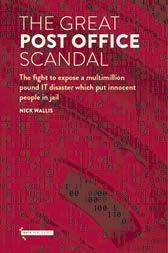
Joan Bakewell: Nick’s narrative has the power of a great thriller as he lays bare the lies and deceit that has ruined so many lives.
many times more complicated than the average bank.
The logistics of building, testing and installing a bespoke IT system of this size was uncharted territory for the government, and Fujitsu. 20,000 Post Offices would need 40,000 terminals. 67,000 people with variable technical skills would have to be trained to successfully keep handing out £56 billion in benefits alone to their 28 million annual customers.
Code-writing defeats Fujitsu
The hardware would have to be robust. The software would have to process millions of transactions a year. Training and support would have to be first rate. Fujitsu had bid for IT’s Operation Moonshot by undercutting the competition. Having won the contract, they were realising how complex and expensive moonshots can be.
Conceptually, Horizon was relatively straightforward. The front-end terminals would be custom-specced PCs running Microsoft’s Windows NT operating system. These would sit in a box under each Post Office counter window. Each PC would be connected to a custom keyboard, a barcode scanner, a 3.5 inch receipts printer and a touchscreen, which would sit on top of the counter. Running bespoke Horizon software, each counter PC would write both manually- and barcode-inputted transactions into the branch accounts. Every night all the information collected from the branch would be uploaded via ISDN or (in some cases) satellite to a centrally-located Post Office mainframe.
that over three years, Pathway’s 366 original contractual requirements had been subject to 323 formal change requests by the Post Office and the Benefits Agency. This was exacerbated, it said, by numerous informal changes and ‘clarifications’ which necessitated ‘significant system re-design.’
Too expensive to kill
Frustrated with the delays, in December 1997, the Benefits Agency and the Post Office served Fujitsu with a formal notice of breach of contract. Fujitsu, fed up with the way it was being treated, refused to accept the notice. It then upped the ante by threatening to stop work on the Horizon project altogether unless it received a guaranteed hike in the fee it was going to get from each swipe of the DSS benefits card.
The stand-off turned critical when the Benefits Agency responded by announcing it no longer wished to use swipe-cards to dispense benefits payments. Instead, it was going to encourage claimants to have their benefits delivered direct to their bank accounts. In one swoop, Fujitsu’s potential income from the project had been reduced to zero. On top of that, the Post Office was looking at losing a third of its customer base overnight.
In January 1998, serious consideration was given to abandoning Horizon altogether, but the project limped on. Despite a shifting brief and its lack of operability, there was a feeling in Whitehall that Horizon had become too expensive to kill. Someone was going to have to find a way through, because
